Jackson’s Bay, 1874-1879: Resolutely Untamed
The first people breaking new ground anywhere are always brave, strong and visionary. Those who can choose where to break that ground make sacrifices because they believe in their choices. Others have circumstances thrust on them.
If it had not been for an 1879 commission of inquiry into the Jackson’s Bay Special Settlement, we would have known little of the challenges and adversities that the first settlers endured there. Official records would have remained as just that—officially formal and detached from the reality of life that many people endured in what is still one of the most remote places in New Zealand.
The Polish settler families who became part of the fractured community between 1875 and 1879 would have melted away. Official correspondence about their existence in the settlement would have been left at comments on two tragic deaths, and the group as a whole blamed for the demise of the settlement.
This story has been possible because English-speaking settlers who felt they had been exploited and unfairly treated, had the courage to protest. They wrote to newspaper editors and drew the attention of Hokitika’s House of Representatives member, Edmund Barff. They petitioned the colonial government.
In researching this story, I made extensive use of the Appendixes to the Journals of the House of Representatives and put slightly less weight on anonymous, individual letters to editors. I noted that those with grievances who spoke at the inquiry, held at the Hokitika courthouse, had to have the means to get there. For those who left Jackson’s Bay destitute, and who lived far from Hokitika, travelling there would have been beyond them—even if they had known such an inquiry was happening.
Today Jackson Bay has lost its possessive.
—Barbara Scrivens
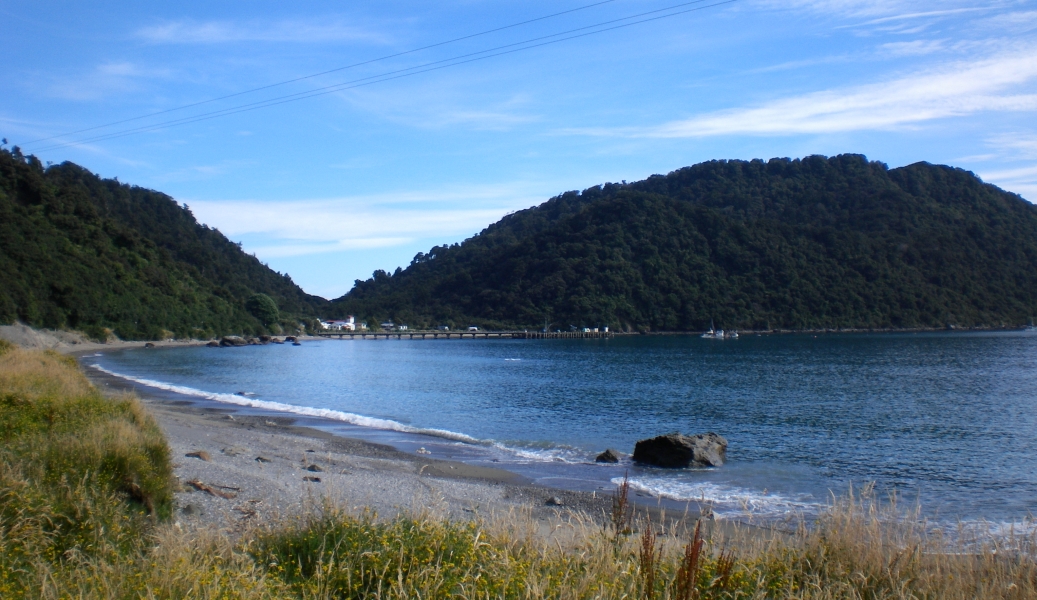
Jackson Bay in 2010.
THE END OF THE ROAD
by Barbara Scrivens
Resolution of the House of Representatives, 20th August 1878.
That the Government be requested to take immediate steps to cause a public and impartial
inquiry to be held into the working of the Jackson’s Bay Special Settlement, and that any persons who may feel themselves
aggrieved may have ample opportunities afforded them of giving evidence on oath before any tribunal which may be
appointed.—
(Mr. Barff.)
European settlers first waded through the chilly summer waves of Jackson’s Bay nearly 150 years ago.
We know the names of the 23 men—many with families—who stepped onto its rocky shore. We know the date: 19 January 1875. We know they were promised a bright future. We do not know whether that particular day contributed to the more than 300 centimetres of rain that fell on 186 days that year.
Originally from Scotland, England, Scandinavia, Canada and Germany, those first settlers were chosen for their experience as colonists in New Zealand, and were expected to pass on their knowledge to future immigrants.
During the next four years, at least another 122 single and family men joined them, including at 30 Poles, most with wives and children.1
Those who arrived in 1878 still trudged through the same water, but had an increased probability of being drenched from above as well as by the sea. Rain on 212 days that year pushed the annual precipitation to nearly 350 centimetres.
By the time the commission of inquiry sat in March and April 1879, 95 surnames disappeared from the list of inhabitants. A longer registry of wages and debts at the local store shows others joined the settlement informally. Of the 174 men on that list, the word “left” remained against 113. Seven were dead.2
Five men and a 10-year-old boy drowned in one incident off Big Bay in 1878. Rosalia Witzki’s death was profitable for a west coast times correspondent. At least six newspapers repeated the “horrible accident” that befell her:
…the wife of one of the Polish settlers at Smoothwater, named Wietzki [sic]. A coroner’s inquest, presided by D. Macfarlane, Esq, R.M, elicited the following:—On the 30th June, Wietzki was cutting down a tree which he had already been admonished two or three times to remove, because it was close to the house, when suddenly the tree, which was rotten in the middle, fell down upon the roof of the house, crushing to death, the poor woman who was at the time engaged in household duty, and had her infant child in her arms. The latter, however, was providentially saved from the horrid death of her mother. The jury returned a verdict of “Accidental death.”3
In a letter dated 27 July 1877, resident agent for Jackson’s Bay Duncan Macfarlane told Westland superintendent Edward Patten: “I have the honor [sic] to report that on 29th June a settler’s wife at Smoothwater met with her death through the falling of a tree on his house.” Macfarlane’s official explanation omits to say that the tree was rotten, that he ordered Franz Witzki to cut it down, or that it was so close to the house:
The circumstances were as follows:—The husband of the deceased was cutting down a tree in the neighbourhood of his house, and he told his wife to keep outside until such time the tree was down, as it might fall on the house. She expressed great fear about the tree, but, for some unaccountable reason, just before the tree was cut through, she went inside, and before she could get out she was caught by the falling tree and was killed on the spot…4
Macfarlane: “The accident threw quite a gloom on the settlement.”
If he did find out Rosalia’s or Franz’s names during the coroner’s inquest he presided over, he did not mention them in his report. The newspaper correspondent found out the family name, yet to Macfarlane they remained as anonymous as the felled tree. Of the 16 recorded burials and deaths in the Arawata Pioneer Cemetery records, Rosalia’s entry is still: “UNKNOWN Polish settler’s wife, killed by falling tree, 29 June 1877, Polish Settlement, Jackson’s Bay.”
The Witzki family of five arrived in Jackson’s Bay in July 1876. Franz left with his children, Julianna (8), Bernard (5) and Franz (3), six months after the accident.
_______________
The first group of settlers arrived with framing for 20 government houses. Off-loading in the choppy surf would have been more problematic than deciding where to erect them—the area immediately adjacent to the beach provided the only flat ground. The cottages became rent-free accommodation for them while they cleared their own land and built their own houses.
Colonial surveyors praised the area for its potential. They maintained that the mountains surrounding Jackson’s Bay held gold, silver, quartz and coal; that the dense timber waited to be cut and sold to a ready market; that the harbour teemed with fish.
While his reports brimmed with positivity, the two maps drawn by Westland’s chief surveyor and provincial engineer, Gerhard Mueller, clearly show the settlement’s geographical challenges.
Five rivers south of the substantial Haast cut up the land. The Okuru (north) and Turnbull rivers joined at the estuary, the Waiatoto and the Arawata (now Arawhata) ran through the flatter land, and the narrowest Smoothwater river south of Jackson’s Bay butted against a range of hills, all shown in the map below.5
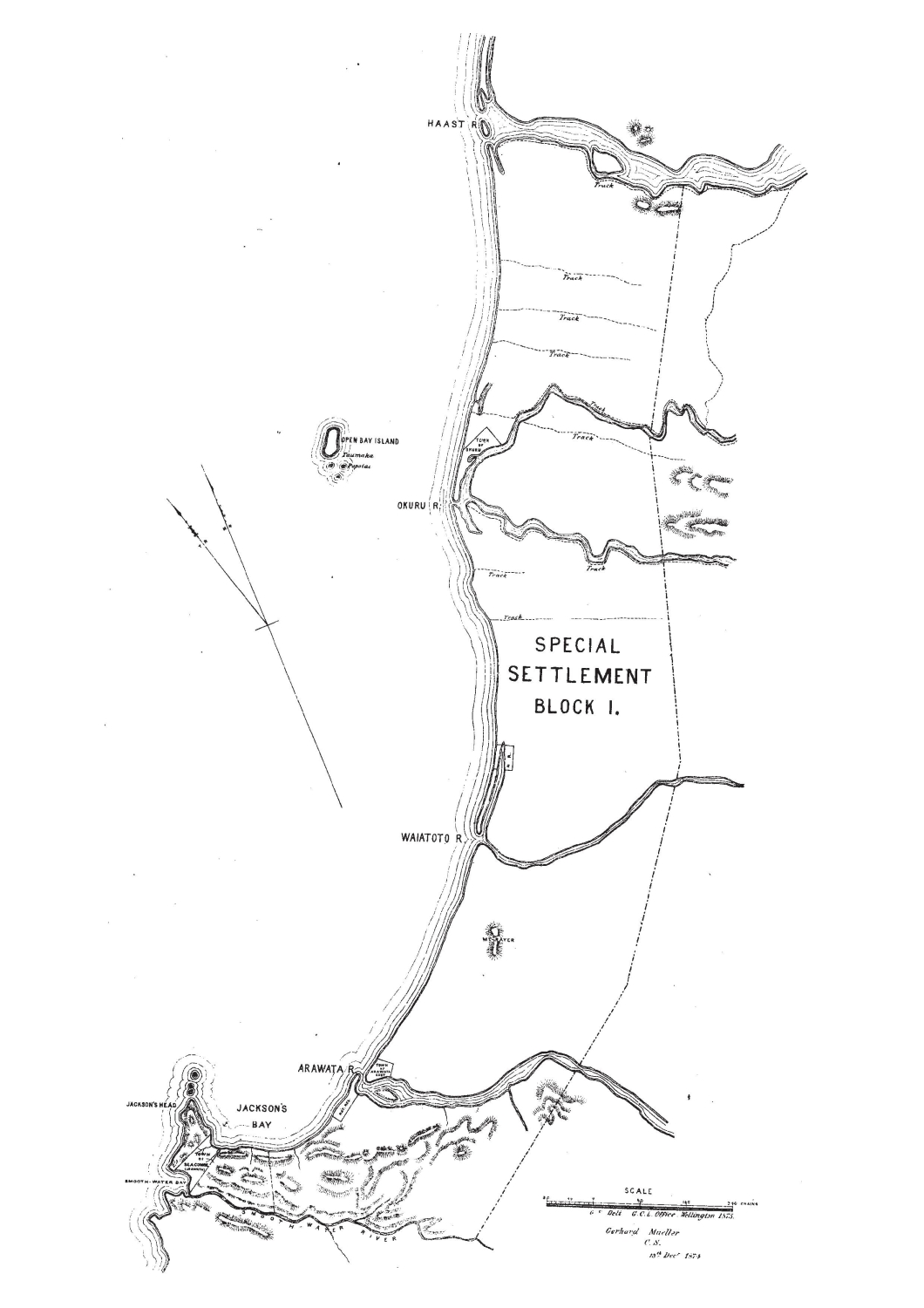
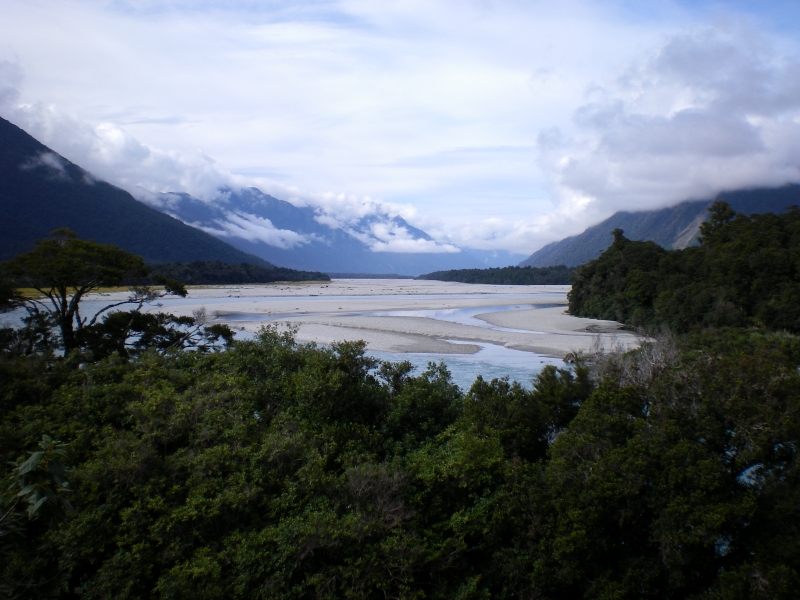
The Arawhata river, north of Jackson Bay, in 2010.
Transport overland was never going to be easy for settlers. They relied on provisions delivered by steamer. Jackson’s Bay itself may have provided the best natural harbour on Westland’s coast, but the hills and the widest Arawata river hemmed it in.
_______________
The settlers who came and left between 1875 and 1879 bore the brunt of the blame for the settlement’s eventual, inevitable failure. They arrived with hope, fuelled by the promises of the government’s advertising pamphlet. They left, often destitute, their efforts thwarted more by an unpredictable and unreliable bureaucracy than anything the terrain or climate threw at them.
The New Zealand government allocated £20,000 for Jackson’s Bay, a site chosen by a Westland Select Committee. Decision makers either did not consider negative aspects of the area, or glossed over them. Government ministers and their advisers in Wellington seemed unaware of the brutal and unrelenting climate, the density of the forested interior, and the obstacles facing anyone building anything on a craggy terrain that habitually dislodged tree avalanches.
The government promised prospective settlers employment, land under “extremely reasonable conditions” and provisions “at cost.” Sections (land) sold to settlers were to help repay the government’s advance to the settlement.6
At first, the inducements created more applicants than positions. Westland’s superintendent, James Bonar, wrote to immigration minister Harry Atkinson telling him of the “great care” he had taken in selecting suitable candidates.7
The grey river argus printed out the extensive conditions in its 21 January 1875 issue, two days after the first settlers arrived. (See the full conditions accompanying this story.)
The last point explained what the proceeds from the sale of land had to stretch to:
16. The money to arise from the sale and disposal of lands within the said settlement shall be applied for the following purposes:—
- – In defraying the expenses incident to the formation and laying out of such settlement:
- – In making and constructing roads and any other necessary public works within such settlement:
- – In establishing, endowing, and maintaining public schools and any other necessary institutions within such settlement:
- – In maintaining communication, either by sea or land, with such settlement:
- – In constructing harbour works, wharves, &c, for the settlement.
By the time they reached point 16, earlier statements may have already seduced potential settlers: Seven years’ rent entitled them to “a grant of the land without further payment.” They were to be “landed free of cost” and allowed to live “free of rent for a period sufficient to enable them to get dwellings erected on their own sections.” Another statement assured employment at “half time during the first two years of settlement.”
At a £3 yearly rental for a suburban 10-acre section, it is not clear how the creators of the document envisaged the settlement ever being in a position to fund its own infrastructure, never mind pay back loans. The free government cottages occupied the flattest quarter-acre sections. Who would have bought the other town sections? The settlers needed to establish themselves in their 10-acres. Living in the town may have appealed to employees of timber and fishing industries, but those did not materialise. Diggers tended to live in tents close to the sources of their claims, and used hotels when they came into “town.”
“It was thought likely at first that discoveries of minerals would give the district a start, and that those settlers who had cleared their ten-acre sections would be able to sell them, and go on to their [50-acre] rural sections. But a mistake was made at first in sending the first settlers before the surveys had sufficiently progressed,” Mueller told the Jackson’s Bay commission of inquiry on 5 April 1879.8
The first settlers could not have seen Mueller’s ambitious map below of the proposed Arawata township, dated April 1875.9
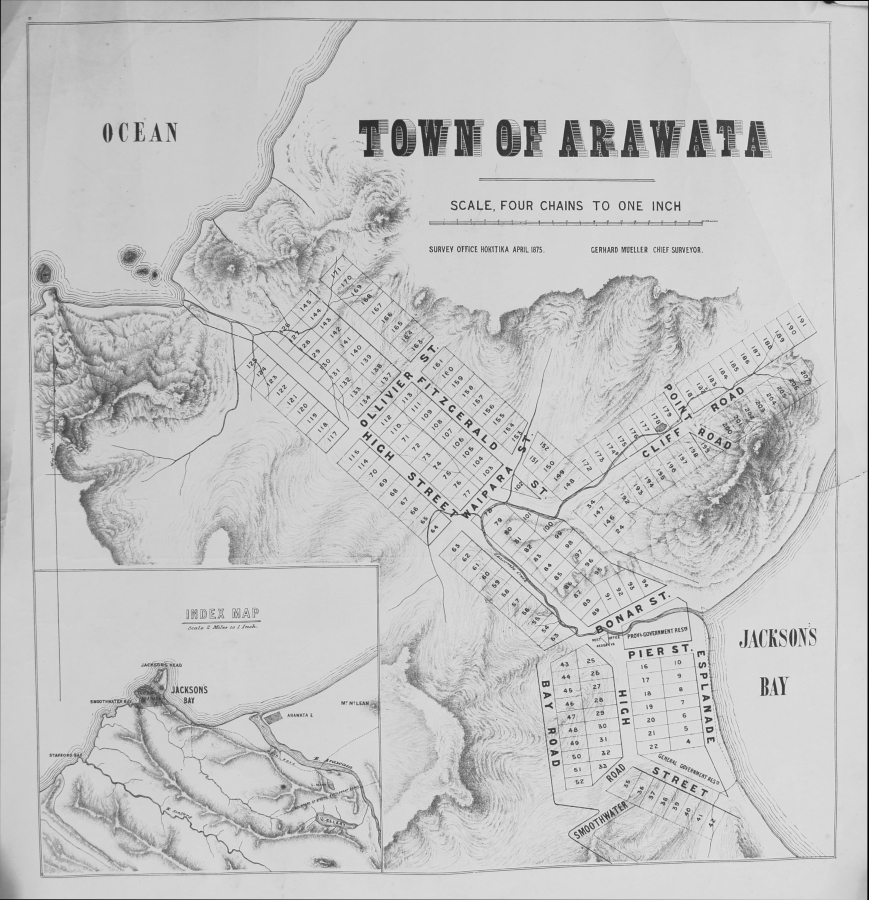
Mueller drew 207 “town” sections, averaging 900 square metres, between Jackson’s and Smoothwater Bays. At first, he suggested that each settler receive a town, a suburban, and a rural section.
His map shows that his geometrical divisions of the town sections bear little connection with the terrain. He conceded the “hilly nature” of the township made it “peculiar” and that the roads for these sections would have to accommodate the contours.10 Mueller placed roads and the provincial government reserve over significant streams or rivers running towards the shore. Any kind of road or building was always going to have to accommodate extensive—and costly— structural engineering.
Did the first settlers erect the government cottages along Mueller’s original roads? Unless Macfarlane had a copy of the unpublished plan, probably not. Within four months, the settlers had built blacksmith’s and carpenter’s shops, and a toolhouse on one side of the flat beachfront (bottom right on the map above) and on the other side, a government store and surveyor and resident agent’s offices.11
_______________
Weather observations did not seem to feature in the chief surveyor’s December 1874 report yet “exceptionally bad seasons” bore much of the blame for the settlement’s problems.
In the end, backtracking on the most basic of necessities—a jetty—became the insurmountable hurdle that helped Nature win the 1875–1879 battle at Jackson’s Bay. Without that jetty—estimated to cost £1,500—industry could not develop, and without that industry any anticipated private employment vanished.
The wild environment loomed large in Jackson’s Bay then, and still does. The heavily timbered hills and gullies plummeting towards rocky shores and narrow beaches continue to reflect the unrelenting rain.
Weather observations did not seem to feature in the chief surveyor’s December 1874 report yet “exceptionally bad seasons” bore much of the blame for the settlement’s problems.
When selling the idea in 1874, Mueller enthused about the area’s untapped value to the new colony. He declared that it contained “the very best description of agricultural land.”
He proclaimed the creeks would “prove of the utmost advantage to the settlers.” He brushed aside the same creeks’ steep banks of three to six metres, saying they would provide “natural main drains.” He did admit the area between the rivers north of Jackson’s Bay held a large proportion of “very swampy land” but asserted that settlers with “experience” could easily drain it, and be rewarded with a “great depth” of good-quality soil.12
Mueller’s opinion that a “very large extent of superior land… is ready for the plough as soon as cleared” summarises his tenuous linking of the area’s apparent potential and its major drawback: To access any arable land, the bush needed clearing. Mueller, like other officials, underestimated the difficulty of that process.
Superintendent Bonar surveyed the then-proposed settlement on 22 November 1874 with a group including Mueller and another surveyor, John Browning. They saw a flourishing timber industry, supported by the “practically… unlimited demand” in New Zealand and neighbouring colonies. The prospect excited Bonar to such an extent that he stressed in a letter to the immigration minister that “no time should be lost” in procuring a tramway with light rail for the project. He predicted those sawmills employing many immigrants.13
The 12 Polish families who settled there discovered too late that the benign-looking river with an amiable name had a tendency towards regular and destructive flooding.
In the same letter, Bonar enclosed Mueller’s glowing report, and that of the chief harbourmaster for Westland, Thomas Turnbull. The difficulty in landing supplies presented the largest obstacle for settlers in Jackson’s Bay, said Mueller. He recommended building a jetty running out to the deep water. Turnbull said that the anchorages at Jackson’s Bay were “perfectly safe for shipping.” 14
Thanks to Browning, Smoothwater became one of the preferred sites for settlement in the area. Browning was “favourably impressed” with what he overestimated as 6,000 acres of viable land. It was little more than 1,000. The 12 Polish families who settled there discovered too late that the benign-looking river with an amiable name had a tendency towards regular and destructive flooding.15
Mueller expanded on explorer and geologist Dr James Hector’s geological survey of new zealand during 1866 and 1867, in which Hector associated gold with the grey quartz and black iron sands along the beaches near Jackson’s Bay.
Mueller said that gold had been found “on every beach and in almost every water course” in the district and he was “absolutely certain” that the discovery of gold would “at once attract a large population.” Heavier gold, he said, “has become a fact.” His message:
There is moreover the work of ‘beach combing,’ which has been successfully carried on… Whenever black gold-bearing sand is covering the beaches, the settler may leave off cultivating his ground for a few days and take to beach combing—one of the easiest and withal most remunerative descriptions of gold working, and, so earn a few pounds in a very short time.16
_______________
If the surveyors had spent more time in the area's forests and rain, in differing seasons, they may have recommended slower-paced development. They may not have underestimated so severely the harsh terrain, climate, and never-ending supply of sandflies, always ready to feast on new skin. Captain James Cook mentioned the annoying insects in his May 1773 journal, when the hms resolution sheltered in Dusky Sound about 250 kilometres south of Jackson’s Bay:
The most mischievous animal here is the small black sandfly which are exceeding numerous… wherever they light they cause a swelling and such intolerable itching that it is not possible to refrain from scratching and at last ends in ulcers like the small Pox.17
A hundred and two years later the west coast times wrote about the:
…good men… accustomed to the exigencies of such a life as they may be expected to lead in a bush-covered country… If there could only be discovered a panacea for sandflies, many in Hokitika would have good reason to envy the prospects of the pioneer settlers of Jackson’s Bay.18
Official niggles emerged within three weeks of the first settlers landing. Bonar’s urgent and positive letters to Atkinson pressing for haste in constructing roads, the tramway and a jetty did not receive a reciprocal response. The establishment of sawmills depended on a tramway to remove logs, Bonar said, and he reiterated the need for a jetty. Off-loading steamers directly onto the beach in “even a moderate swell… would be a work of considerable risk, both to boats and cargo.”19
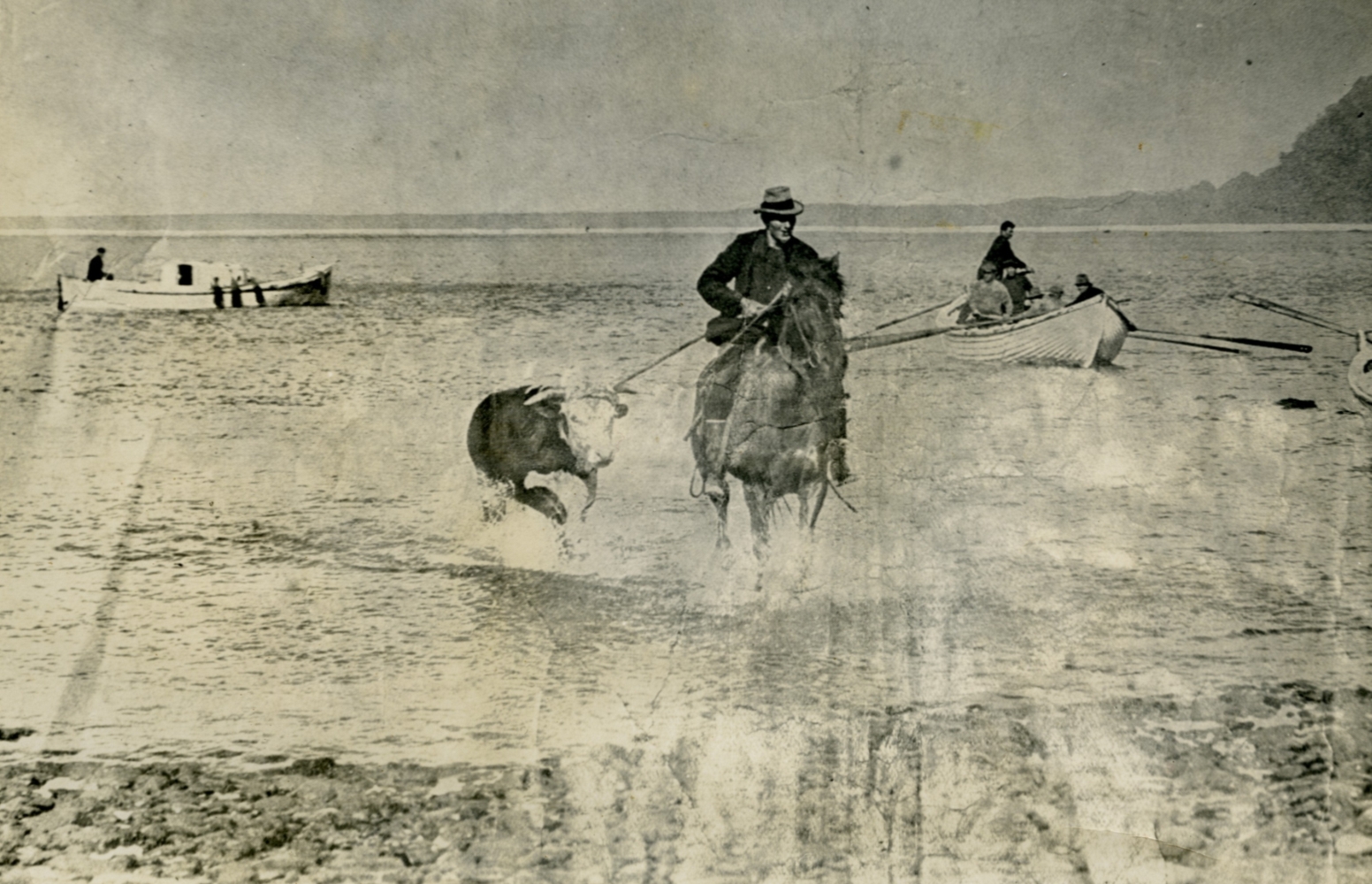
Fifty years later “work of considerable risk” continued at Jackson’s Bay. A weekly news photographer captured this image of Paddy Nolan leading a Hereford stud bull ashore in 1926. The Jackson's Bay resident had apparently bought the bull on a trip to the Southern Sounds and transported it on the government steamer tutanekai, still anchored. (Photograph 002146 from the Hokitika Museum.)
Bonar responded that those labourers already in the settlement were “barely sufficient” for the “most urgent works required.”
Bonar’s desire for haste may have stemmed from his aspirations for his Westland province, little more than a year old when he wrote his first letters to the colony’s immigration minister.
Atkinson dampened Bonar’s enthusiasm. The government’s initial agreement with Westland to advance “a sum not exceeding £20,000… for settling and locating immigrants” turned into “only £12,000… available for all expenses connected to the settlement…”20
In the same letter, Atkinson told Bonar to stop sending any more settlers to Jackson’s Bay than were “actually necessary.” Westland’s shortage of labour at the time meant that losing men to Jackson’s Bay would “necessarily increase the cost and difficulty in carrying on the public works on hand.” Bonar responded that those labourers already in the settlement were “barely sufficient“ for the “most urgent works required.”21
Atkinson’s attitude reflected the settlement’s status during the next four years. It lurched from crisis to crisis until the commission of inquiry, and afterwards settled into inconspicuous existence.
_______________
In 1874, Bonar knew exactly the type of immigrants needed to tackle the steep hills and dense forests, and help set up timber, agricultural and fishing industries. As part of the on-going Immigration and Public Works scheme, Bonar requested 250 families, the first 50 “experienced hands” from the West Coast. He wanted a “large proportion” of 150 immigrant families from the UK to be members of the Agricultural Labourers Association. He requested Shetlanders for their fishing knowledge and experience.
…recent gold rushes in the vicinity added a tantalising glow to advertising pamphlets… attempting to entice immigrants…
Pomeranians were to fill the final 50 places. Bonar heard they were “especially suited for such a settlement” from a local Pomeranian, Julius Matthies, who had spent a “considerable” amount of time exploring “our southern country,” and who seemed keen to encourage his own countrymen and women to follow him.22
Matthies’s report to Bonar oozes enthusiasm. Matthies believed the “proved failures” of previous settlements in Martin’s Bay and Stewart’s [sic] Island stemmed from “great inducements to acquire land” and “depending on only one branch of industry.” He extolled Jackson’s Bay for its “advantages of successful agriculture, comparatively a near market, and riches of the sea”23
Besides opportunities for agriculture and timber industries, recent gold rushes in the vicinity added a tantalising glow to advertising pamphlets written by government officials attempting to entice immigrants from the UK and continental Europe.
New Zealand’s agent-general in London, Dr Isaac Featherston, arranged a German translation of “books of general conditions of the settlements” for Matthies.24 It is unclear whether any of the Poles who arrived in New Zealand between 1872 and 1876 ever read the books, or met Matthies, who died in 1875.
… the 1879 commission listed those Poles as: Stobo, Shoplifski, Kempfeld, Jaques, Pritzki, Shamlifski, Tobian, Rosanoski and Donitz.
Settlers trickled into Jackson’s Bay far more slowly than Bonar anticipated. He implored immigration minister Atkinson for more, but waited in vain for his 150 British families with agricultural backgrounds. He complained of “scarcely any immigrants for the settlement.”
A month later, nine Polish families and at least one German family landed in Jackson’s Bay. They had all arrived in Wellington aboard the lammershagen on 11 July 1875. The return of settlers presented to the 1879 commission listed those Poles as: Stobo, Shoplifski, Kempfeld, Jaques, Pritzki, Shamlifski, Tobian, Rosanoski and Donitz. (Corrections and variances of their names are on the accompanying list of polish settlers in jackson’s bay.)
Bonar’s messages to Atkinson must not have been clear—or were ignored—because in March 1876 Atkinson used Westland’s “apparent inability to take more than a limited number” as his reason for not providing Bonar with immigrants. The immigration minister, however, “had reason to hope” that he could dispatch 400 adults there by the end of that year.25
Bonar said he was “quite willing” to take German families if there were none from the UK and suggested 30 families from the shakespeare be forwarded to Jackson’s Bay as “the German [sic] families already located are getting on very well.”
By July 1876 immigration officers in Wellington admitted that although they were sending down nearly 40 “Prussians” to Jackson’s Bay “at their own request” the general demand for labour had dwindled, and “the foreigners… not nearly so readily absorbed and provided for as the British.”26
The settlers at Jackson’s Bay disputed the notion that there was a shortage of work. The promised jetty was not built, neither were roads. (The light rail had long-since been dismissed.) The unfinished track through Haast Pass, planned to link the South Island’s west and east coasts, still offered contracts. The settlers saw the logic of building sawmills among the timber. With their own sections not yielding much in the way of edible crops, they became desperate for jobs.
Rather than a shortage of work, the settlers believed that resident agent Macfarlane was allocating the work unfairly.
Scotsman John Murdoch arrived on the first steamer with his wife and four children, and testified at the commission that he averaged one and a half days’ work a week over three years:
Instead of the settlers getting work, it was withheld from them until their store account had run up… Work was given… to those settlers who were most indebted to the store… One of the reasons given by Mr. Macfarlane for not employing me was that he must employ those most indebted.27
Other settlers shared his frustration. Bartholomew Docherty asked for “equal justice,” which to him meant “equal work.”28
_______________
The need for immigrants and infrastructure coincided with the collapse of Wellington’s assisted immigration scheme from continental Europe. Eleven weeks after the fritz reuter left Hamburg with 292 immigrants in April 1876, Atkinson instructed Featherston in London, “in future no foreign nominations are to be accepted except under very special circumstances.”29 On the day the fritz reuter arrived in Wellington—4 August 1876—Atkinson sent a telegram no agent-general could misinterpret: “Send no emigrants Jackson’s Bay special settlement.”30
Learmonth made a blatant admission that Jackson’s Bay provided the solution to Wellington’s difficulty in providing “foreigners” with employment.
Featherston, with failing health, may have received Atkinson’s previous instructions, but not taken much notice. He resigned from office on 17 June, and died in Brighton two days later. Sir William Powell, former director-general of the War Office, replaced him temporarily.31
Would Jackson’s Bay have succeeded if it received the promised 250 families, or if its administration honoured its promise of two years’ part-time work for the settlers it did get? One cannot say because neither happened.
Bonar’s plan to populate Jackson’s Bay predominantly with British people unravelled when he received a letter from immigration officer FA Learmonth in July 1876. Learmonth made a blatant admission that Jackson’s Bay provided the solution to Wellington’s difficulty in providing “foreigners” with employment.32 He blamed the continental Europeans for their inability to speak English, yet did not seem to question why his own government had not considered more highly the ability to communicate in a common language when it first opened the colony to those very immigrants.
Learmonth informed Bonar that of the 301½ adult immigrants who arrived in New Zealand the previous year three-fifths were foreigners, 124½ “German” (some were German, most Polish). Bonar’s hoped-for British immigrants, Learmonth said, “were all of a very superior class to what was formerly sent to Westland, and soon found suitable employment [elsewhere] at fair rates of wages.”33
Clearly, Jackson’s Bay did not have the appeal that Bonar, his surveyors, and supporters like Matthies expected.
(The fractions above result from the method used to calculate fares under the assisted immigration scheme. Immigration officials classed anyone younger than 12 as equivalent to half a “statute” adult. They did not count anyone younger than a year, whom they classed as “souls” who received free passage.)
_______________
Would the Poles in Jackson’s Bay have fared better if Matthies had not died? Chief emigration agent in Prussia, a Mr Kirchner, wrote to Featherston in August 1875 informing him that his Berlin agents told him:
… notwithstanding all their caution, [Matthies] allowed himself to be entrapped by the Prussian police, and that, having acted in contravention of the laws, a bill was filed against him, and he was to have been committed to prison… the excitement produced apoplexy by pressure on the brain.34
Matthies left a widow and four children in New Zealand. With his death, the Poles in Jackson’s Bay lost an interpreter who seemed on friendly terms with administrators such as Bonar. They also lost a vivacious spokesperson.
Matthies’s September 1874 report to Bonar regarding the Pomeranians reveals his natural ability to persuade—and stretch the truth. Among general praise for his compatriots, Matthies claimed that they came from a similar coast to Jackson’s Bay, and were accustomed to agriculture and fishing. He declared that the Pomeranians’ “ great resemblance in manners and otherwise to the British nation, [and] close connection of language, would soon cause them to be amalgamated with the present population of the Coast.”35
Pomerania’s smooth coastline on the Baltic Sea in no way resembled the rugged West Coast and it was fanciful to insinuate that Pomeranians living under Otto Von Bismarck’s intense germanisation drive could speak English. Although the Polish translation of their collective name, Pomorzanie, means people from the coast, those living inland were mainly farming serfs.
In 1876, then-immigration agent Theophilus Daniel of Riverton, Southland, begged Wellington to jettison the assisted immigration scheme in favour of a nomination system. Daniel, who later become mayor of Riverton and a member of the House of Representatives from 1881 to 1884, believed that overseas agents “considerably misrepresented” conditions in the new colony:
I have found recent arrivals… landed almost destitute of anything resembling suitable clothing for the colony, the articles brought out with them altogether useless… they appear to be under the impression that the colony was much further advanced than it really is.36
Under their contracts, emigration agents working in Europe, such as Kirchner and Matthies, received £1 for every “statute” adult who arrived in New Zealand.
_______________
Several of the first Polish settlers at Jackson’s Bay chose sections at Smoothwater, “thrown open” soon after their arrival in August 1875 via the lammershagen. Macfarlane told the 1879 commission that he had been “prepared to give them every information” and that he called for tenders to build houses for them. It was in Macfarlane’s interest to move new settlers from the free government cottages into their own sections—he could charge rent from the day a settler selected his own piece of land.37
“We did not sell the land, we simply left it… Mr Macfarlane was scolding my father for going away from Jackson’s Bay… I said the land was flooded, and we could not grow crops.”
Macfarlane contracted AF Porter to build Franz Max’s house. Max, who described himself as “a farmer from my youth” but “no builder” asked another settler, carpenter and plumber Robert Crawford, to inspect the workmanship on his behalf. Crawford found “bad” shingling on the roof, insufficient roofing battens, “badly” attached angle bracings and “badly” nailed weatherboarding. Max refused to accept the house. Macfarlane seemed surprised at Max’s fuss and insisted repairs were easy to do.38
The Smoothwater river soon showed its penchant for flooding. Mueller blamed the settlers who, in clearing their ground, blocked the stream with felled trees, causing “frequent overflows.”39 Macfarlane told the commission, “the strip of good land was too narrow, and the fallen trees in the river caused the lands on the banks to flood; and besides it is very heavily timbered.”40
Flooding caused many settlers to abandon their sections, among them John Tobian and his son, Rudolf. They lived in a government house until they took up adjoining 10-acre sections about six miles from Jackson’s Bay. It is not clear from reports whether this was in Smoothwater or Arawata but they had a two-room house built on one section. (Tobian’s wife and other four children who arrived with him in Wellington are not mentioned in the reports.) Tobian senior told the commission that by August 1876, “We left the house because the land flooded and we could not get crops… I could not keep occupation of it because of the water on it.”41
Rudolf Tobian testified: “We did not sell the land, we simply left it… Mr Macfarlane was scolding my father for going away from Jackson’s Bay. He said it was not right for him to go. I said the land was flooded, and we could not grow crops.”42
Mueller’s perverse criticism of the Poles for the flooding of their sections reflected the trend of those with vested interests in Jackson’s Bay: Surveying for the special settlement was lucrative—surveyors’ bills amounted to more than twice the resident agent’s salary. Number 13 of the General Conditions assured the settlers that “experienced surveyors” would lay out sections. Those surveyors should have identified potential flooding problems.
Settlers had to clear land to create space for their homes and crops. Mueller’s chastising the Poles for doing exactly what they needed to do made little sense. The felled trees had to go somewhere. Some settlers used them to build dam walls. The narrow strip of flat land alogside the river created havoc when floodwater scooped up the logs. Mueller admitted to the commission of being “in a hurry” and not visiting Smoothwater until after the survey was nearly completed. He told the inquiry: “Browning’s recommendation was too hastily given” but would not admit his own role in endorsing settlement on unsuitable land.43
_______________
Settlers’ submissions at the commission portrayed a haphazard granting of contracts by Macfarlane, not necessarily to the cheapest tender, nor to those best qualified. The contracts often involved an amount owed to the government store.
Sub-standard engineering resulted from different people working on the same sometimes small contract, coupled with Macfarlane’s apparent inability to listen to settlers’ complaints or suggestions.
Another of the first Scotsmen, Thomas Beveridge, tried to “draw the attention of Mr Macfarlane and the engineer to various matters.” Beveridge had taken up a section on the northern bank of the Arawata river. A year earlier, a road from Jackson’s Bay to Arawata was built, as well as a bridge across a “creek” above his property. Beveridge paid particular attention to the project because it affected his access to Jackson’s Bay and his land, where he lived with his wife and six children. As part of the overall roading project, three separate “parties” built a “two-foot drain” through Beveridge’s land, at a cost of £50.
James Nightingale was “overseer of works.” His inspection of the road construction seemed enough for Macfarlane, who ignored Beveridge’s assertion that—among other things—the drain through his land was “not half big enough for the purpose.”
Within the year a “great many chains [one chain equals about 20 metres] [were] being washed away for want of a culvert.” The bridge, instead of allowing water to flow, became a dam that “stopped up” above Beveridge’s section. The creek overflowed and “destroyed” the road as well as Beveridge’s property.44
Creating adequate drainage did not seem a high priority at Jackson’s Bay. The little built seemed to do no more than move a flooding problem from one place to another. A drain built through Antonio Max’s neighbour’s property in Arawata, for example, ended at their common boundary, flooding Max’s land and denying him access. After three years, he gave up. He told the commission:
I thought I should get good land. I was told so before I came to Wellington and Hokitika. That was the reason I came… I have tried to make my home here, but I cannot see that I can. If I were certain of getting work here I would remain. I am married with five children. If I can get a passage [back to Hokitika] I will go. I cannot stay unless I can get work to provide myself with necessities for my family.45
Re-doing work was a matter of course. Mueller distanced himself from the wire bridge across the Turnbull river that was carried away by flood. It is not clear who received the contract to save the material and rebuild it, apparently with the same result.46
_______________
Some Hokitika residents clashed publically with officials at the town’s wharf on 5 February 1876, in support of Poles who returned from Jackson’s Bay after refusing to disembark in “wild-looking country” where they could see former neighbours from Poland “going in rags.”47
Those Poles had spent 109 days at sea aboard the shakespeare, which sailed into Wellington harbour on 23 January 1876, and quarantined on Matiu/ Somes Island until immigration officials passed them fit to enter the country eight days later. According to the west coast times of 9 February 1876, 56 shakespeare passengers transferred to the steamer wallace [sic], bound for Hokitika, and were “at once transhipped to the waipara for Jackson’s Bay.”48
… his reason for giving evidence… was “[T]o show that compulsion was put upon the immigrants… to try to force them to go to Jackson’s Bay.”
Peter Helming witnessed the Saturday evening scene. A mechanical engineer living in Hokitika, he saw “women and children were crying and wishing to go on shore” but not allowed. Helming recalled the first steamer as the murray and not the wallace.
Eight single men, aged between 21 and 35, abandoned any luggage they may have had in the murray’s hold, “threw the small swags they had” towards the wharf, and disembarked despite an order not to. The waipara’s captain noticed them, and moved his vessel between the murray and the Hokitika wharf to block other passengers from following. Helming saw the last man jump off the murray as the waipara was “slewing around [and] her stern touched the wharf. Bystanders on the wharf reached their hands to help the man coming ashore, to prevent him going overboard.”
Hokitika drapist, a Mr Davidson, and tobacconist, a Mr Apple, both asked Bonar to allow the men into the immigration barracks, but he refused. Helming questioned the men, who told him that they wanted not land, but a share in the “plentiful employment” they were promised in Hokitika. Among the eight were a shoemaker, a baker, a silk-ripping weaver and a butcher. Frederyk Grazewski, 34, was the only Pole. The commission spelt his name “Grafansky.”
Helming: “They asked me if they were compelled to go. I said, ‘You are in a free country, and you can do as you like.’” After finding out that the men were refused entry to the immigration barracks, Helming invited them home and gave them dinner.
Helming, at one time an inspector of works for Mueller, said his reason for giving evidence at the commission was: “[T]o show that compulsion was put upon the immigrants… to try to force them to go to Jackson’s Bay.”49
Herman Meyer, a hotelkeeper in Hokitika, acted as interpreter that evening on the wharf. He told Learmonth that the Poles were under the impression that they would each receive 50 acres of land in Hokitika. Meyer said they seemed satisfied regarding his explanation that Jackson’s Bay was “only another part of the province” and they agreed to continue south.
Bonar told the new immigrants that if they remained in Hokitika they would have to provide for themselves “but, if they went to Jackson’s Bay, the government had built houses for them, and they would get work, as was in the pamphlet which they had, and also fifty acres of land.”
Later, several other ‘Germans’ living in Hokitika approached the Poles bound for Jackson’s Bay to dissuade them from returning, “as it was no good.”50
It is not clear how the west coast times counted the 56 Poles involved, but the newspaper reported that 24 “statute adults” returned to Hokitika. The Osiowski (Osofski, Offsoski) family of seven was among the few who landed in Jackson’s Bay and stayed. Several men explored the surroundings and spoke to people on the shore. Anna “Zylifski” joined them.
It did not take the shakespeare Poles long to confirm what they heard in Hokitika of their compatriots’ wretched lives in Jackson’s Bay: If this was freedom in New Zealand, it seemed worse than the lives they had left behind in Prussian-partitioned northwest Poland.
The shakespeare Poles’ refusal to land in Jackson’s Bay led to an immediate inquiry chaired by Bonar and Learmonth in Hokitika.
_______________
Settlers on Jackson’s Bay beach told Józef Stachurski they had no doctor, and it was “impossible to live here.” Pushed by Learmonth at the inquiry, Stachurski expanded: “everything was very dear,” the settlers “could not do more than pay for their provisions” and they “must live like wild beasts.” Another Jackson’s Bay settler told him that “it was quite impossible to cultivate mountains, which for half the year were covered with snow.”51
“We expected to see a town or village, and, on account of not seeing one, we got frightened,” a translator said on Stachurski’s behalf. Stachurski, husband of Anna (née Szreder) and father of Maria (5), Józef (2) and Rosalia, born at sea, nearly did not make it back to the waipara. According to the west coast times, “Coming back, he jumped into the water, and was nearly drowned.”52
In Hokitika, Bonar asked Stachurski what he expected to do.
I will do anything. I do not want to stay in the barracks. I would rather go away to-day than to-morrow if I could only get work. I am willing to work at once.53
Bonar to the interpreter:
Tell him he has thrown away a very good chance of getting a permanent settlement in the country, and that they cannot remain here [Hokitika immigration barracks] more than a few days. If they refuse the Government offer, the responsibility must rest with them.54
The interpreter replied that Stachurski’s impression in Wellington was that the settlers would find accommodation and work in Hokitika, and that they had never heard of Jackson’s Bay.
Bonar:
The Government had gone to great expense in order to send them where there was work to do, and they have deliberately refused it. That is what I want them to understand.55
Bonar did not appreciate Stachurski’s response that people in Jackson’s Bay told him they worked there, and starved there:
You may tell him that there are 200 or 300 people there, and that there are plenty of applicants from the Coast who would be glad to go on the same terms, but we have been keeping it for the foreign immigrants coming into the country. We have refused hundreds.56
Stachurski said he spoke to settlers who wanted to leave but could not, and saw women crying.
The rest of the inquiry into why the shakespeare immigrants refused to land at Jackson’s Bay became a repetition of the above exchange, those presiding over it generally disbelieving the immigrants’ statements.
Mueller participated in the Hokitika inquiry in his capacity as provincial engineer. He disputed the statement of another Pole regarding people he had known “at home… going about in rags” in Jackson’s Bay.
According to the west coast times’ summary of proceedings on 9 February 1876:
Mr Mueller remarked that there must be something radically wrong in the immigrant’s statement [that after paying for provisions, he and other settlers had nothing with which to buy clothes]. The Germans [sic] had not been working three days, but six days, receiving 48s, and as their expenditure could not be anything equal to it, they must have pounds in Mr Macfarlane’s books. They must have from 28s to 34s per week.57
Mueller seems to have been the only person to believe that the settlers had six days’ employment per week.
Anna (née Fiatek) “Zilawski” returned to the waipara without her husband, Frederyk. (Spelling variations of their surname were Zyglewski, Ziglefsk, Zylifski, Zylawsky, Zyglensky and Czuglewski. The Polish spelling was Czygłowski, and would have ended with an “a” to denote her gender.) She told the inquiry that the shakespeare Poles had expected to stay in Hokitika and were “removed without being consulted” to Jackson’s Bay. She said that she was not used to “such a wild-looking country” and refused to return.
She knew that at Jackson’s Bay they got 8s a day for three days per week, but they must drink tea three times a day, and likely to get into debt. As soon as she went ashore she found a woman who had been in service with her, and as soon as the woman saw her she commenced to cry, and asked her if she was one of the unfortunates ones to come there. She then told her that they were in debt, and would never come out of it till they died. They did not say they did not get enough to eat, but clothes were such a price that they would not pay for them. What cost tuppence at home cost two shillings there. She repeated she would not go to Jackson’s Bay; her husband must come to Hokitika.58
Weronika (née Majewska) Bielski told the same inquiry that she and her husband, Walenty, immigrated to New Zealand “in consequence of the glowing accounts they heard of the country.” She did not go ashore with her husband and two of their three children, who were not allowed back on board the waipara. She heard from other passengers about settlers in Jackson’s Bay being so much in debt that she “would die here” [Hokitika] rather than go to there.
Johan Senger did manage to re-board the steamer after he explored the Jackson’s Bay “mountain… The scrub you couldn’t get through, and you couldn’t look over.” He did not see any clearings or homesteads:
He was told that there were settlers that earned 24s per week for three days, but it just covered the cost of their provisions. He was told they could work on their land for the rest of the time, but that the settlers had not taken up their land, as they could see it was not worthwhile troubling. People in Hokitika told him not to leave the steamer… After that they formed the intention not to stay at Jackson’s Bay. They intended to stay in Hokitika… If the Government could not give them work here, they should send them back to Wellington, and, if not at Wellington, they should send them back to Prussia.59
The interpreter’s repeated use of “wild-looking” reiterates Theophilus Daniel’s assertion at the time that immigrants arrived in New Zealand with the impression of a colony further advanced than it really was. The Poles may have come from a culturally oppressive society, but continental Europe lay within many hundreds of years’ civilisation, where people did not have to hew shelter from a surrounding forest, and where even the poorest peasant could cultivate basic vegetables.
Immigration minister Atkinson reported the shakespeare incident to agent-general Featherston in March 1876, saying he enclosed a report from Bonar regarding the reasons for the refusal, but it is not with the other enclosures in the parliamentary papers.60
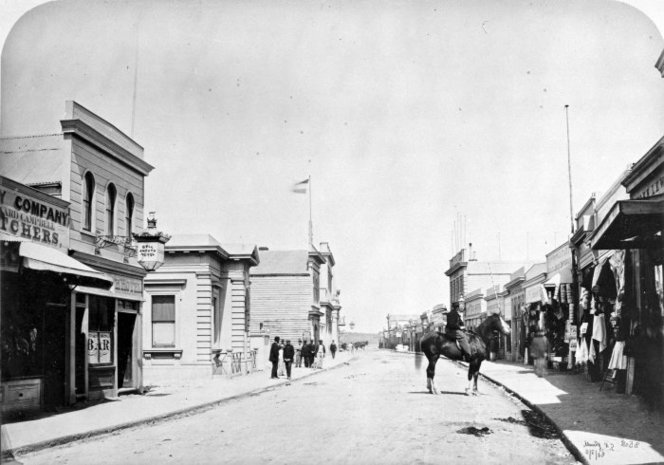
Two photographs of beachfronts, Hokitika's Revell Street, above, in 1868 and below, Jackson's Bay, more than 300 kilometres south, in 1880. Daniel Louis Mundy photographed Revell Street61 (Photograph from the Alexander Turnbull Library) and James Ring took the one below, captioned “Jackson’s Bay looking north.” The grafton is in the bay and the unidentified men and cargo would have come ashore on the dingy.62 (Photograph 002147 from the Hokitika Museum.)
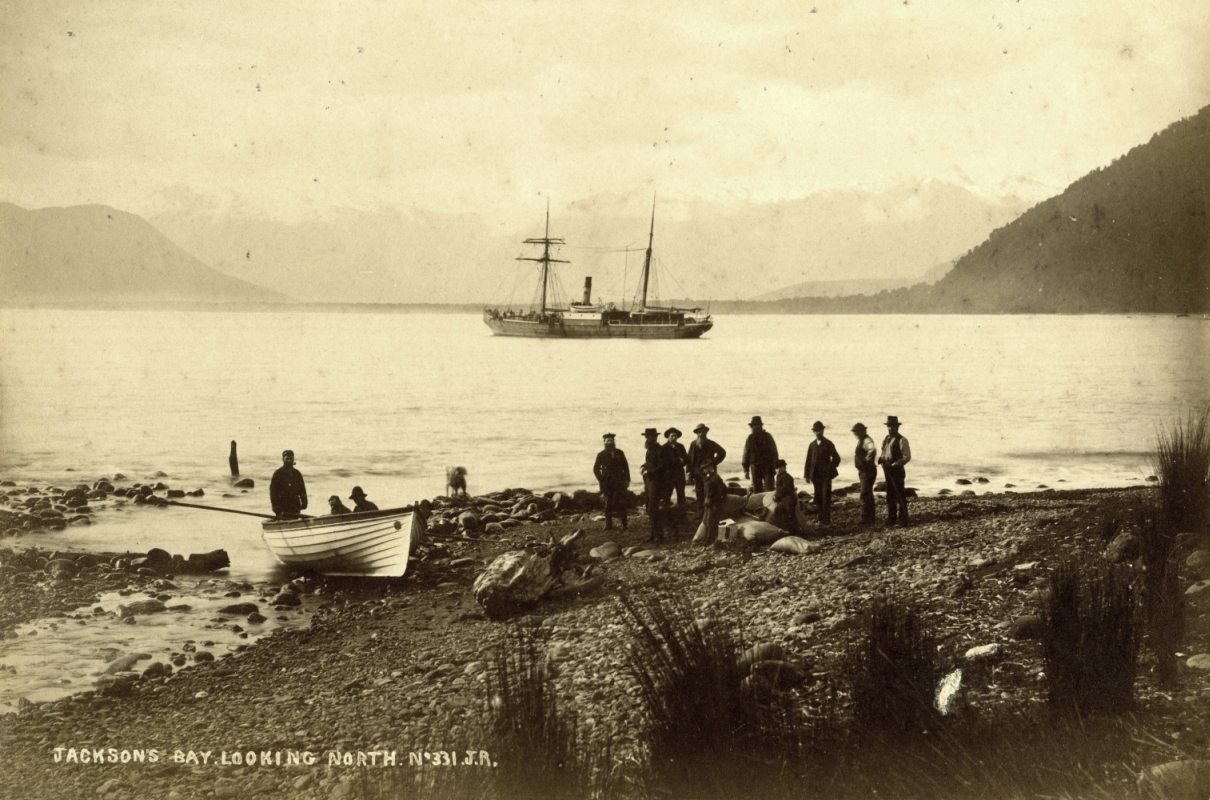
Despite negative rumours, more “foreigners” did arrive at Jackson’s Bay in 1876, including a group of Italians, several with families, and Polish immigrants from the terpsichore, which arrived in Wellington on 18 March, and the Kurowski and Lipinski families off the fritz reuter, which arrived at the same port on 4 August. Franciszek Kurowski drowned with five others in June 1878, their boat believed to have been swamped while on the way to a prospecting expedition south of Jackson’s Bay. His pregnant widow and four children left Jackson’s Bay that December and settled in Taranaki. (See the kurowski-crofskey family and the fritz reuter stories.)
Although both Anna “Zilawski” and Weronika Bielski told the shakespeare inquiry they refused to return to Jackson’s Bay, both did. Anna gained notoriety as the woman involved in an altercation with Macfarlane and his storekeeper, Adam Crone. Macfarlane had given Crone instructions to refuse her provisions. When told she may not have a bag of flour, she went behind the counter to fetch one. It is not clear how many men it took to remove her from the shop, but she landed on the ground outside—without the flour, and the door closed.63
The official list of settlers shows that Frederyk “Zylifski” left Jackson’s Bay in December 1876, Martin Osiowski and his family left in October 1878, and Walenty Bielski left with his family in December 1878.
_______________
Diametrically opposing views regarding the Jackson’s Bay settlement continued to make headlines as protagonists wrote to editors. Officials like Macfarlane labelled the settlers who complained as lazy, ungrateful, and of trying to cheat the system.
Macfarlane voiced his displeasure of his critics by calling them “scurrilous pens… used for the purpose of damning the settlement right through.” 64
“Special Settler” wrote to the otago daily times on 6 January 1876:
… we are for the last two months, owing to non-appearance of the S.S. Waipara, almost out of provisions. The S.S. Maori, from Dunedin, has been here four times since the Waipara, and only brought a few tons of goods, and the consequence is, we have had to live chiefly on flour and tea. A telegram was sent from Hokitika, via the Bluff per S.S. Maori, early in November, stating the Waipara would be here on the 18th of that month, but did not come. The Maori was again here on the 17th of December, and brought five tons of goods, including one bullock, for about 200 people, and also the news that the Waipara would be here in four days. From that date, which is three weeks ago today, and no steamer, and the only way we have of making our grievances known is through the Press. We have to pay a very high price for our things. Dunedin flour, £18 per ton, inferior potatoes, £14 per ton; meat, fresh, 8d per lb; preserved 10d, when attainable, which is very seldom—that is meat and potatoes. A great many of the settlers have land cleared for potatoes, but could not get them, and the ground lying cropless. Such is the state of things at this settlement. Captain Malcolm, of the S.S. Maori, informed me some time ago that he could land flour here at £14 per ton, and potatoes at £6 per ton; and he also sold some fresh meat to the settlers at 6d per lb. But most of the settlers are in debt to the Government store, and, receiving no money for their labour, could not avail themselves of the chance.
… We have regular steam communication between Dunedin and Jackson's Bay, and provisions are at least thirty per cent cheaper. This is a material item to settlers with families, who, by their agreement, only receive 24s per week for two years. Some of the settlers have been here now nearly one year, and the rural land was only open for selection on the 3rd inst., after taking nine months to survey for one hundred and twenty 50-acre farms, and, nine-tenths of them under water; in fact the whole block set aside for settlement. From the Arawata to the Haast rivers is nothing but a succession of lakes and lagoons. I do not think there will be ten sections taken up by the settlers here. They have most of them erected houses on their 10-acre sections, and the opinion of most of them is that they have nine acres too much now. The road that runs from the bay to Arawata river—a distance of seven miles—about five miles are cleared of bush, and 25 chains of it formed. This is all the work done in the settlement up to the present time. We have a fishing company started here, but it is expected to meet the same fate as the coal mine there was so much blowing about by the Resident Agent, but turned out nil. They did not get as much coal as would weld a pick, after six months' prospecting.65
The grey river argus, after the editorial below, published two more letters from settlers on 18 March 1876:
The Jackson's Bay Settlement is attracting considerable attention, not on account of its favorable [sic] condition, but on account of its entire unsuitability and alleged mismanagement. Of course its promoters and the Resident Agent endeavor [sic] to make the best of it, and generally deny the truth of the numerous complaints that have been made. This is but natural. It is not likely the Resident Agent would do otherwise, considering that his situation depends upon the continuance of the transport of deluded people to the place. An elaborate defence written by him, in reply to the letters of Mr Hoos in the New Zealand Times, appears in the West Coast Times of yesterday, which, with the private information in our possession, we cannot accept, unless with a considerable amount of salt. A person, not a settler, but who has been down to the settlement for purposes of his own, and who has just returned, gives as a truly pitiable account of the condition of the settlers. He says that there is no land worth anything; where it is not swamp it is sand or shingle, and that when cleared it is useless for cultivation. The case of the women and children is described as melancholy in the extreme. The heads of families can earn barely sufficient to procure the necessaries of life, and their wives and children are going about bare-footed and ragged, unable to purchase needful clothing, and are generally in a miserable condition. We have received two letters from the settlement, which we publish below. Some of the statements may be exaggerated, but it is patent that unless the settlers are to become paupers on the State, the settlement will have to be abandoned.
“One of the Deluded” wrote on 6 March 1876:
The wilful and disgraceful waste of public money in this place at present, ere long, will be something to be deplored. The whole settlement, from Jackson's Head to the Haast, for agricultural or any other purpose, would be dear at [£]5, bought in one lot. The whole is one mass of rivers, rocks, shingle, swamp, and impenetrable jungle…
… I say this place is wrongly represented. The man that wrote that pamphlet regarding the capabilities of this jungle and eel pond was like Tom Bowling, he could spin a good yarn. It is in every way calculated to deceive the public. The place is not fit to turn out wild pigs on. The most of us are heavy in debt for our tucker, and half starved at that, and how we are going to pay I don't know.
Part of another lengthy, undated letter from “A Settler”:
The pamphlet published by the authority of the Government stated that provisions would be supplied at cost price. Now, our interpretation of the word cost price was that provisions would be supplied to us at a lower price than Hokitika general retail price. No one would have attempted to come to settle and work at Jackson's Bay for one shilling an hour had they known that all their earnings would be required to keep them in the rough necessaries of life. Touching the description of the country given in the pamphlet, it is not the paradise that it has been painted. The land put aside for settlement was said to be clothed with the luxuriant growth of fern trees, whereas it is an impenetrable forest of red birch, and that it is of no earthly good, with a dense undergrowth of bush lawyers…
… we were hunted out of the Bay in the worst part of the winter, without a house to put our heads in, and compelled to build huts and clear bush on these small blocks of land that would not support one man throughout the year.
… the result of this arbitrary act of the Resident Agent in compelling us to make improvements on these small blocks of land, is that twelve months labor [sic] has been thrown away on useless land, and we are now too poor to take possession of the 50 acres and pay the rent.
… Had the settlers been treated with justice they would have been allowed to continue to work on the road till the 50 acres were open for selection, then we would have been in a different position to what we are now—that is, we would not be in debt.
… and those unfortunates that dared to insinuate that provisions were not sold at a fair price were punished that is, if we may judge by the small amount of money that they were allowed to earn in comparison to others.66
Edmund Barff was re-elected to the House of Representatives in 1876. As editor of the hokitika evening star, he received several letters from Jackson’s Bay settlers.
“There is favouritism here… Some men are always at work; others are not,” said “A Digger.” 67
One of the earliest letters Barff received came from digger James Teer and referred to the shakespeare incident:
… you have heard of the landing of the German “convicts,” as they are called here. The scene on board the “Waipara” was one of the most disgraceful ever witnessed in a civilized community, and will be a lasting shame to Westland, if not to New Zealand. It was very fortunate that the present officials here had not many friends on board, or I am afraid there would have been bloodshed in trying to force the deluded unfortunates on shore. The captain of the “Waipara” personally tried his utmost with his own hands to put them on shore, but soon found out that he had not strength enough, and was forced to let them remain. No doubt they have found out from some of their countrymen of the swindle—for this place is nothing but a complete public swindle, and a useless waste of public money…68
The settlers continued to write to Barff both in his capacity as editor and as their representative politician. One of the last letters came from “A Settler” who in April 1876 complained, “we are now denied writing material at the store; we are told there is none.” 69
__________
Allegations of not only expensive but also inferior goods supplied to the settlers threaded through submissions. Irishman Bartholomew Doherty, another of the first settlers, complained that oatmeal and flour were “bad.”
Eighty years later Frank Heveldt remembered the state of the flour. His parents paid full passage from Hamburg on the lammershagen. They moved to Jackson’s Bay independently a week later. Heveldt’s 1961 interview with radio new zealand features in Julia Bradshaw’s book the far downers, the people and history of haast and jackson bay. Frank’s boyhood memory of the Jackson’s Bay store:
All the damaged cargo was sent [to Jackson’s Bay] and we had to take it or leave it. I remember going in, my mother and I, to get a fifty [lb bag] of flour and there was a lot of it on the counter… and you wouldn’t know it was flour—it was just a big heap of weevils. If it wasn’t for that I wouldn’t remember anything about it, but it was seeing these weevils rolling, that impressed my mind. We paid top price for it. We had to carry that stuff out six miles on our backs, there were no horses. When we tried to bake it—well, you might as well go out there and get the mud out of the gutters, there would be as much rising in it as there was in that flour. It wasn’t flour at all, it was just weevils and we had to take it or leave it.70
Settlers in Jackson’s Bay provided the government store with a captive market— thanks to having their salaries paid by cheque only redeemable at the store. Without cash, the settlers could not make better deals elsewhere. Rivalry between provinces at the time contributed to higher costs for goods landed in Jackson’s Bay from within Westland than from Otago, but it was not in Westland’s interests to have Jackson’s Bay receiving goods at Dunedin’s competitive prices.
Czaplewski eventually found work for a surveying party in Hokitika and earned £10 10s—on paper. But Macfarlane’s authority as “countersigning officer” for cheques allowed him to retain any money earned on surveys, and forced the earners to buy from the store. This is exactly what happened to Czaplewski, leaving the Pole again without the ability to buy cheaper goods available for cash.71
The Pole soon became ensnared in the store’s accounting system and told the 1879 commission he was “surprised” when denied access to his “pass-book.”
I wanted clothing for my children. Mr Macfarlane refused to give me any, and their clothes were so ragged I could not send them to school. All the time I have been here I have not been able to get clothing for my children. All the covering I could get for them was old flour bags. I did not like to see my children going to school so badly clothed…72
Three of Czaplewski’s six children were school-going age when the family arrived in August 1875. (His surname in Jackson’s Bay was misspelt Shoplifski, Shaplifski, Chablaski and Chabalaski.) The family lived in Arawata where their potato crop failed for three successive years. He told the commission:
… the provisions were charged for in the store too high… [goods] could have been got here for half the price. I wanted some potatoes. [T]hey were sent to the Arawata by the boat. I came to fetch the potatoes from the shed at the barracks. I emptied the bag and picked over the potatoes, and I had to leave half of them there rotten.73
Potatoes spoilt in the ground all over the settlement, and other produce, such as swedes turnips and oats, gave low yields. Settlers lost their first and second crops. The hurried hunt for more seed potatoes from Hokitika late one season became a blaming fiasco that covered many pages of the commission’s 1879 report. Bonar and others dismissed accusations from the settlers regarding attempts to fob them off with rotten, overpriced potatoes.
“The price of goods was so high that it was impossible to keep out of debt,” Robert Crawford told the commission. As well as food, Crawford referred to carpentry tools being more expensive in Jackson’s Bay than in Hokitika. Appointed postmaster of Jackson’s Bay in June 1875, Crawford resigned when his business became embroiled in Macfarlane’s accounting system.74
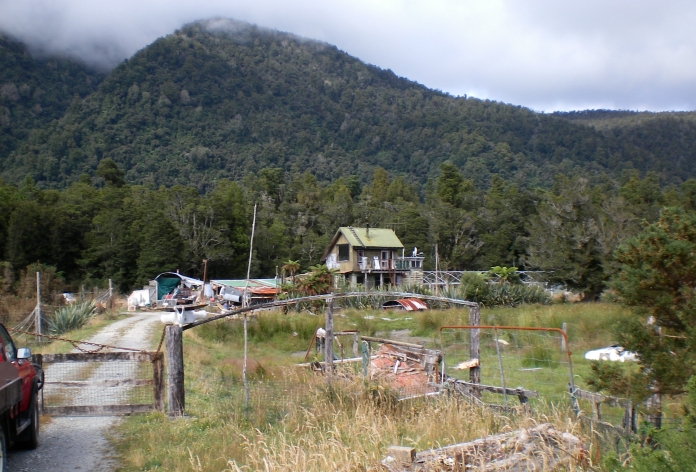
More than 140 years after the first settlers arrived in Jackson's Bay, its steep hills, thick bush and harsh climate make this a tough lifestyle choice.
_______________
By 31 March 1877, resident agent Macfarlane had spent more than £17,500 of the £20,000 allocated to the settlement (or over-spent by £5,500).
Labour costs topped the expenses at more than £10,000. Settlement accounts presented at the commission by Edward Patten—who took over from Bonar in July 1877—show spending on building Macfarlane’s house, offices in Jackson’s Bay and Okura, 50 kilometres of roads, and the beginning of a jetty. Continuing surveys cost more than £3,000. Macfarlane’s own salary “and all necessary tools and appurtenances for works” amounted to nearly £1,300.75
In his 1877 annual report to Bonar, Macfarlane stated his satisfaction with the settlement’s progress “in spite of very great difficulties” resulting from its “isolated position” and its “natural disadvantages from its being unsettled bush country.” He did not seem to consider the settlers’ inability to grow crops because of the rainfall, or the paucity of work, or the lack of a jetty as much of a problem as the presence of Germans, Poles and Italians, who “above all” represented the settlement’s worst problem.
Macfarlane must not have read Bonar’s assertions at the 1876 Hokitika inquiry regarding shakespeare’s so-called “rebels” that “we have been keeping [Jackson’s Bay] for the foreign immigrants.” The resident agent seemed unaware that English speakers were being channelled elsewhere in the colony, and vehemently protested to Bonar that Jackson’s Bay had “become an outlet for Germans and Poles unable to find employment in other parts of the colony… and Italians… unable to speak even the English language.”76
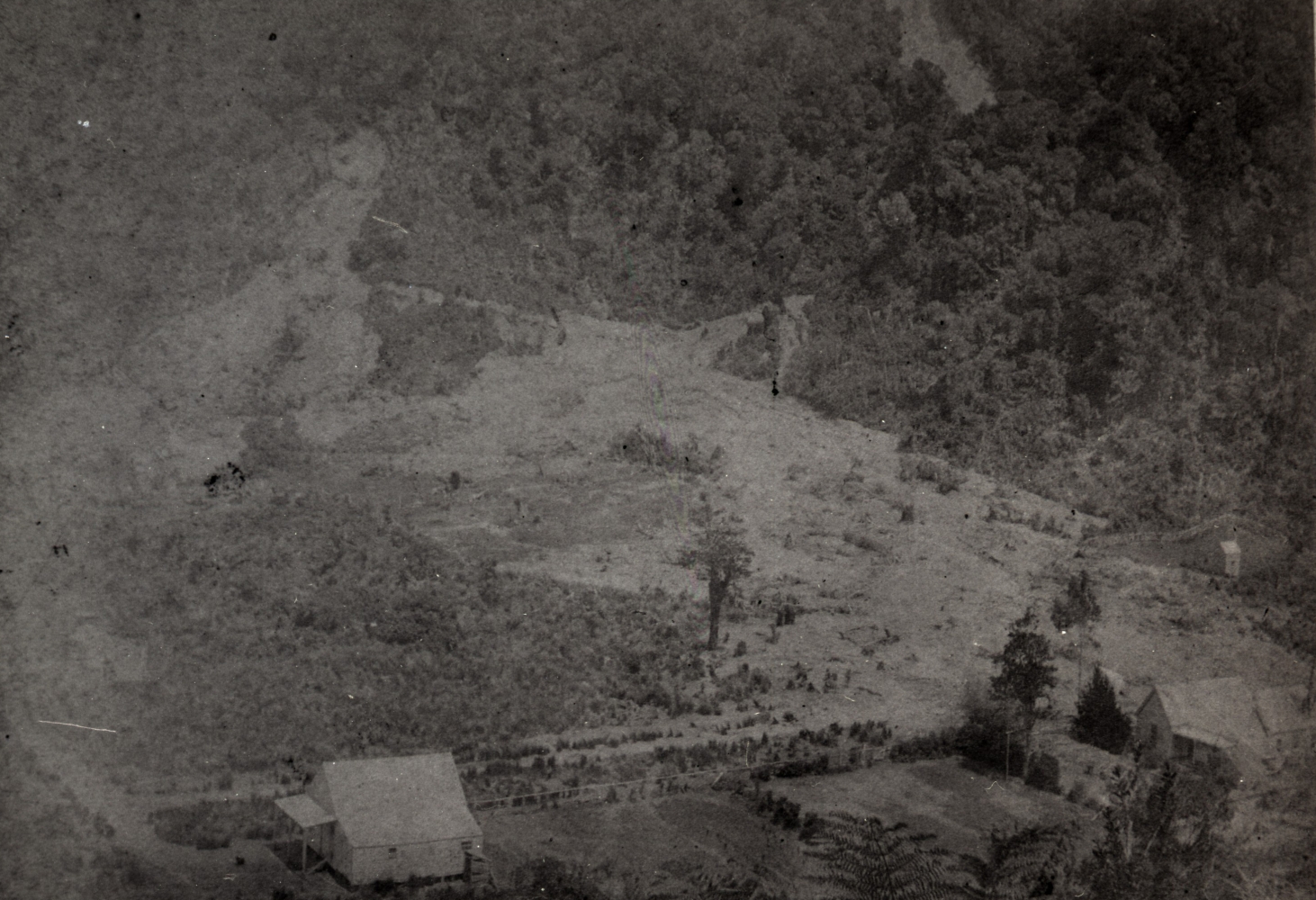
Written on the back of this photograph is: “grandfather’s store at the left and the family home at the right with tennis court.” The pale sections on the top right and left suggest slips off the hills, and flooding through the centre. The photograph below of the Macfarlane house, the “family group” with tennis rackets, and the fact that Macfarlane ran the Jackson's Bay store for several years, points to “grandfather” being Macfarlane. (Photographs 006600 and 006599 from Hokitika Museum.
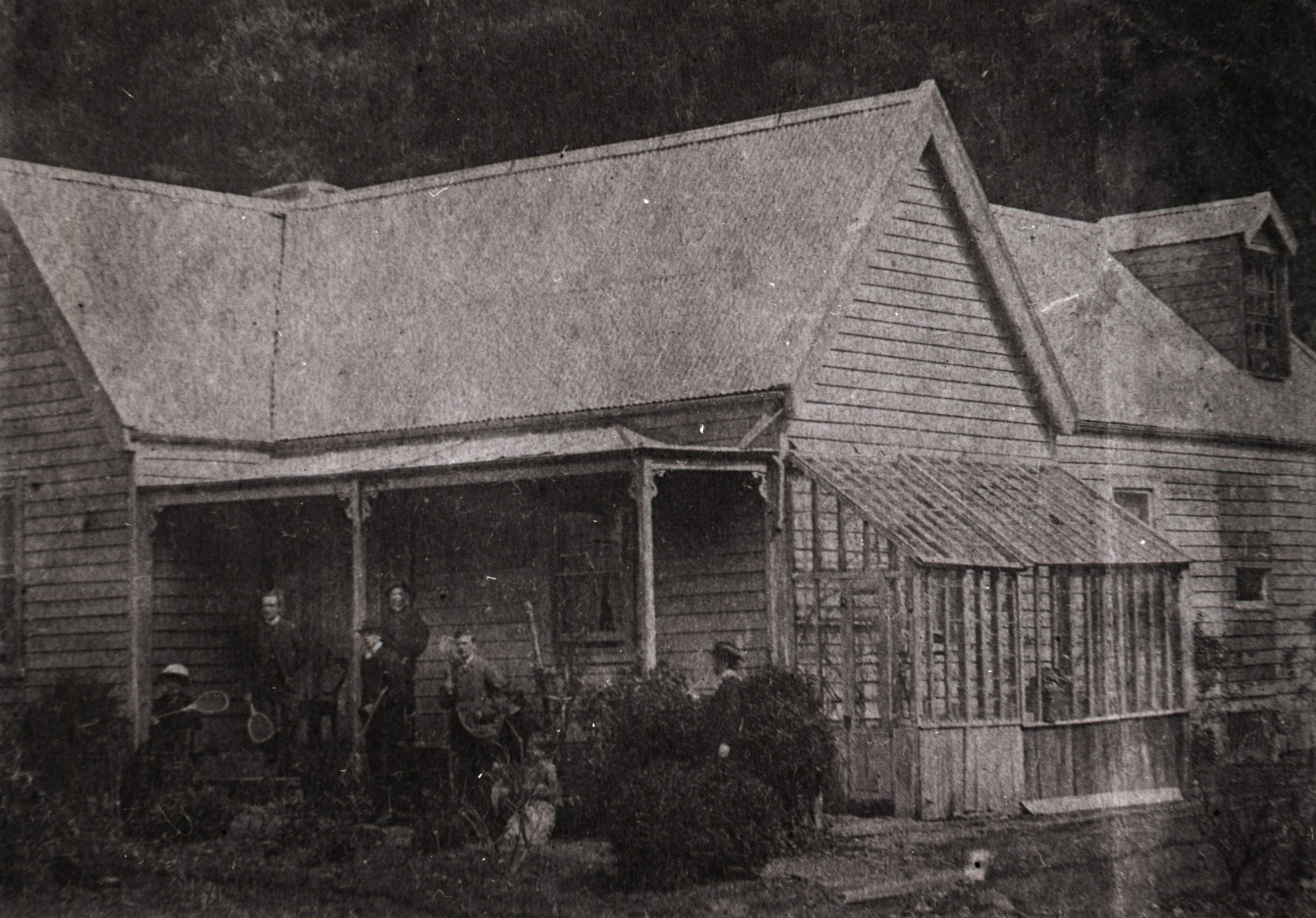
Macfarlane oversaw what he described in 1877 as a “settled population” of 376 people in six areas spanning 30 kilometres. From written reports, the only “settled” people were those who held the few permanent jobs:
In January 1878, John Marks, who had previously run stores in Haast and Okuru, took over the government store from Macfarlane and Adam Crone. Ferryman John Malam ran his service mainly across the bridgeless Arawata river. James Nightingale’s position as “overseer of works” kept him in permanent—and influential—employment. Butcher Charles Robinson supplied the store, yet another butcher, John Love, could not trade after he asked for payment in cash.77 Robinson also kept a hotel in Jackson’s Bay. AF Porter received the contract to build at least some of the cottages for the Poles in Smoothwater, and ran a “small store.” Edmond de Montalk resigned a teaching position at the University of Otago 1877, moved his family to Jackson’s Bay, and ran another store in Okuru. Amos Nicholson became manager of the only sawmill. George Adams became one of the schoolmasters and ran an informal store in Smoothwater with John Murdoch. Adams surprised Crone one day by refunding a shilling he had over-charged for flour. The price fluctuated so much that Crone would not have known.78
Bonar at one stage part-owned the steamer waipara, which shared the Hokitika-Jackson’s Bay route with the maori. Surveyors made good money out of Jackson’s Bay, costing £2,845 in total, and Wellington topping up Browning’s salary by £282.
Mueller told the 1879 commission that the other surveyors “were taken on for that special purpose, and afterwards were continued as staff officers.”79
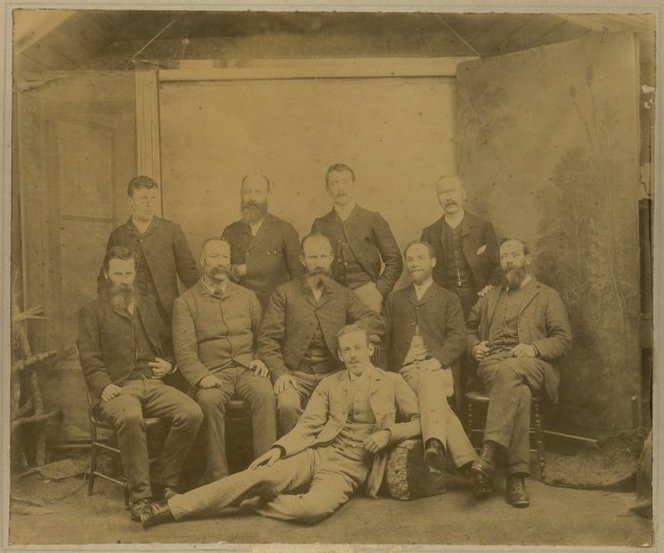
Mueller did not specifically name the surveyors but he appears with Macfarlane in this photograph from the Mueller family collection dated 1888 or 1889 and titled group of surveyors. Mueller is seated in the middle and Macfarlane is standing second from left. Others in the back row are named Pfeifer and Dixon (one person is unnamed and it is not clear who is who). Sitting, from left are George John Roberts and Clarke to the left of Mueller and Murray and Smythe to the right. In front is someone named Wither.80
Hokitika brickmaker James Cox disputed the touted benefit of the surveyors. He moved to Jackson’s Bay in February 1875 after seeing an advertisement saying the government would give a bonus to anyone starting a brick-making business there.
Macfarlane told Cox to ask another ferryman, Carmichael, to find out where the clay was. Carmichael took him to what was supposed to have been a “brick-yard reserve, on the south side of the Arawata river.” Not finding the expected clay, Cox spoke to the surveyor Browning, who said he had not earmarked the clay. Macfarlane convinced Cox to prospect for a week. When Cox returned with “[n]o indication of good clay,” Macfarlane offered him “boating” or “some other” work.
Cox became one of the first employed for “some time” in the “coal-pit.” Three days after saying that Jackson’s Bay coal was “best in the world… all gas and no coal,” he was “ordered out of the drive” and replaced with Macfarlane’s brother-in-law, a Mr Lindsay. Overseer of works Nightingale told Cox he lost his job on account of the men refusing to work with him because he was constantly disparaging the coal.
Macfarlane clearly disliked anyone questioning his authority—and those who did, suffered through unemployment and denied goods at the store.
The only way for Cox to get other employment, Macfarlane told him, was to “put up a house, the same as the rest of the settlers, or have one put up.” The two clashed again when Macfarlane refused to supply Cox with windows and doors. Cox expected to have the same settler ‘privileges’ as those the pamphlet promised. Macfarlane told Cox his “ready money” precluded that.
Cox complained to the commission that “the Government did not encourage the industry as mentioned and promised in the regulations, and that the land was not what it was represented.”81
As resident agent, Macfarlane had the power to “encourage expenditure of capital”82 for sawmills or public works and became a director of one of the first sawmills. He allocated that sawmill’s employment through public works.83
Employment—or lack of it—and the ability—or not—to make a living in the remote West Coast is a theme that runs throughout the official reports and correspondence, and unofficial letters to editors.
Macfarlane’s distain of—and prejudice against—some of the settlers is clear, his disapproval not restricted to those unable to speak English. Macfarlane clearly disliked anyone questioning his authority, and those who did, suffered through unemployment, and denied goods at the store.
After two years, Jackson’s Bay had two schools, but no qualified teacher, no doctor and no church, the lack of which, Macfarlane reported as “… apparently being a matter of perfect indifference… [to the settlers] meanwhile religion and morality suffer for lack of a teacher.”84 His opinion did not match the Poles’ dismay that there was no church in Jackson’s Bay. They did as they had done in Prussian-partitioned northwest Poland, where they had lived under a regime that outlawed Polish schools, the Polish language, and their Catholicism. The Jackson’s Bay Poles continued to celebrate informal sung Masses and taught their children their prayers and hymns.
_______________
The quick exchanges on Jackson’s Bay beach between shakespeare immigrants and Polish settlers in February 1876 summarised the settlers’ predicament—24 shillings a week barely covered the cost of provisions, yet they could not eke a living from the land.
Shouldering the cost of the unproductive land became another burden for the settlers. The General Conditions allowed men older than 16 to own one suburban and one rural section. Rentals were three shillings an acre per year for rural properties and six for suburban. Few settlers transitioned to rural land. Most of them owed £3 a year for 10 acres, amounts added to their store debts.
Macfarlane censured the settlers for those debts. It did not seem to occur to him that his guaranteed salary—£300 a year—was several times that of the unlikely settler able to gain constant paid work. A settler’s salary had to cover the cost of building his own house—and pay for the exorbitant prices charged at the store. Macfarlane, on the other hand, not only had a generous guaranteed income through his permanent position, but also had the building of his house paid for, and held or adopted other paid roles. He became engineer in charge of building the first Bay Road along the seashore. Murdoch told the commission of one result of that appointment:
Almost every flood that came took away the works as fast as they could construct them. The sea threw down the wall… After laying out a large amount of money in making the road… it was abandoned.85
Macfarlane was a shareholder in “the reef.” It is not clear whether this was the coal reef he and Cox argued over, or whether there were several. In April 1879, Mueller presented the commission with reports of “strong indications of coal beds” and the “existence and superior quality” of sandstone, freestone and limestone.86 Other reports wrote of silver and quartz.
Before he moved to Jackson’s Bay, Macfarlane “was carrying on business as a merchant in Hokitika.” Exactly how much his own dealings as a merchant were involved in the two years he ran the Jackson’s Bay store remains murky, but he admitted to the commission that he supplied boots to settlers through his “private account.”87
Irishman John Cronin, a former miner, said Macfarlane “kept drapery in his office, and he sold fearfully bad goods… flannel worn out in a month.”
Bartholomew Doherty complained to the commission that instead of receiving his wages in cash, “I was obliged to take draperies and other goods instead.”88
_______________
Macfarlane managed the settlement’s two-tiered society with detachment.
“It is a matter of perfect indifference to me who supplies the meat to the settlers,” he told the 1979 commission.
Employment options also evaporated for those who asked to be paid in cash, or if they refused work offered.
And later, regarding the shoddy building of settler Franz Max’s house: “It made no difference to me who built the houses.”89
His overseer of works reflected Macfarlane’s disdain for the settlers, at least two of whom Nightingale had, “The settlers were only a lot of paupers.”90
Macfarlane’s power stretched from awarding jobs to deciding how much of people’s wages would be available to them. “The amount deducted for store accounts was left entirely at my discretion.”91
The resident agent made it clear that if he believed settlers were able to pay for goods, he excluded them from his work contracts. This galled those who knew the guaranteed employment lasted only two years, and who needed those wages. Employment options also evaporated for anyone who asked to be paid in cash, or if they refused work offered.92
Macfarlane changed the system of day-labour to one of awarding contracts after he decided the settlers were not working hard enough:
Reference has been made to my having refused work to men on the settlement. On several occasions I did so for this reason—namely, that some of them would pretend to work for the Government, and when asked to work on their own sections they would not do so, and I had no other means of compelling them to improve their sections.93
The contracts were not popular with the settlers because, again, Macfarlane had the authority to arbitrarily create and change specifications. Murdoch complained that when he refused one of Macfarlane’s contracts, because alterations came with no compensation for the extra labour involved, “I was told if I refused the work I should get no more.”
John Skipper, another of the first settlers, felt uncomfortable about taking contract work because he was “unacquainted” with that type of system. Macfarlane told Skipper that he would not get any other work. Skipper, forced into contracting, found he could not make money. When he complained to Macfarlane and Nightingale, “they told me I was not to make money then—that all the money had to be expended on the settlement.”
After several other unsuccessful contract bids, Skipper had a boat built and started sealing. He wanted to leave Jackson’s Bay, but owed the store about £12. Because of this debt, Macfarlane ordered the waipara captain “two or three times” not to take Skipper’s possessions, including a number of tools, to Hokitika. Skipper tried fishing his way out of debt. He asked Macfarlane for permission to supply the settlers with fish in exchange for crediting his store account. Macfarlane refused.94
_______________
If the settlers thought they would get better outcomes by going directly to Wellington, they were mistaken.
The settlers presented several petitions, one of the first asking for a subsidised monthly steamboat calling at all the navigable rivers between Hokitika and Jackson’s Bay:
The petitioners state that sad occurrences, attended with loss of life, take place owing to there being no ferries and bridges on the overland track between Hokitika and Jackson’s Bay. That the track is in many places impassable.95
The government’s petitions committee declined making a recommendation, but the settlers had help with another petition, in 1877:
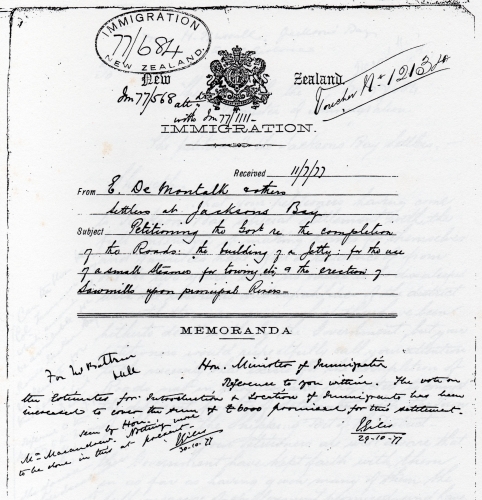
The covering note on the Jackson's Bay settlers’ 1877 petition for the completion of roads, the building of a jetty, the use of a steamer and the erection of sawmills, which showed it was directed to the Minister of Immigration. .
Edmond de Montalk, the language teacher turned Okuru storekeeper, was born in Paris, where his father, Józef Franciszek Potocki, had fled to after the 1831 Uprising in Russian-partitioned Poland. His turn of phrase in the petition he put his name to resulted in one of the petition commissioners referring it to the “treasury:”
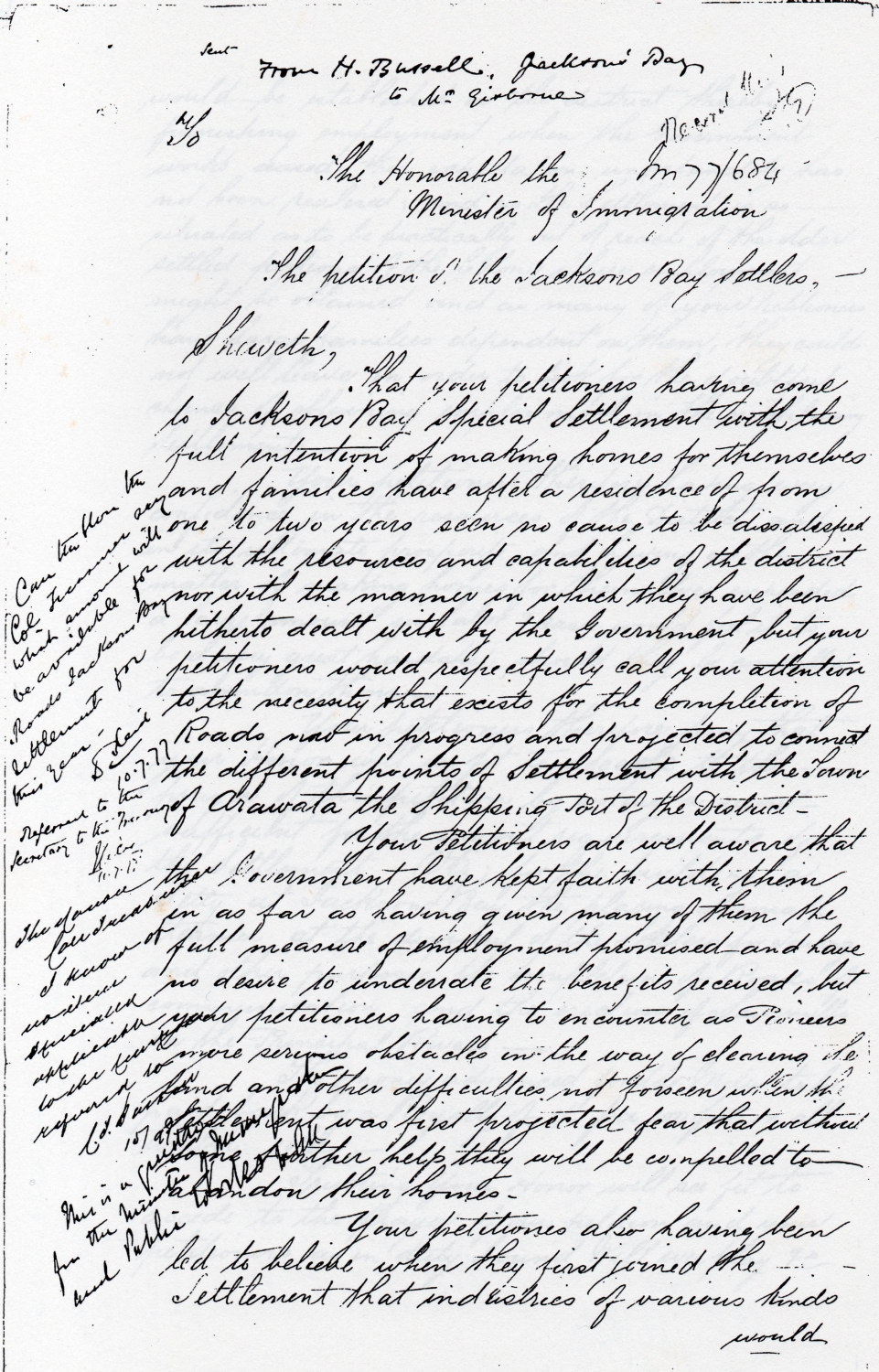
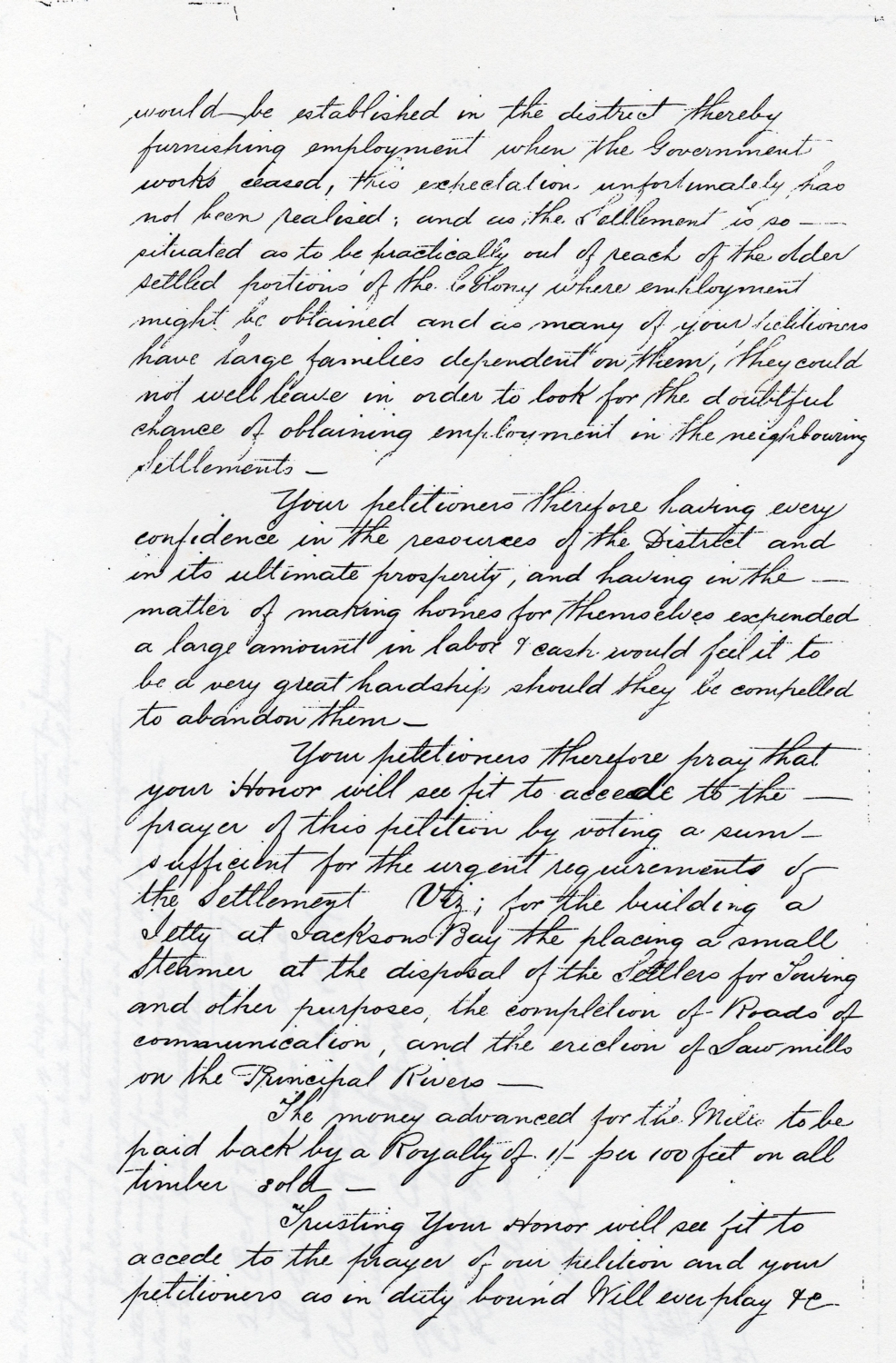
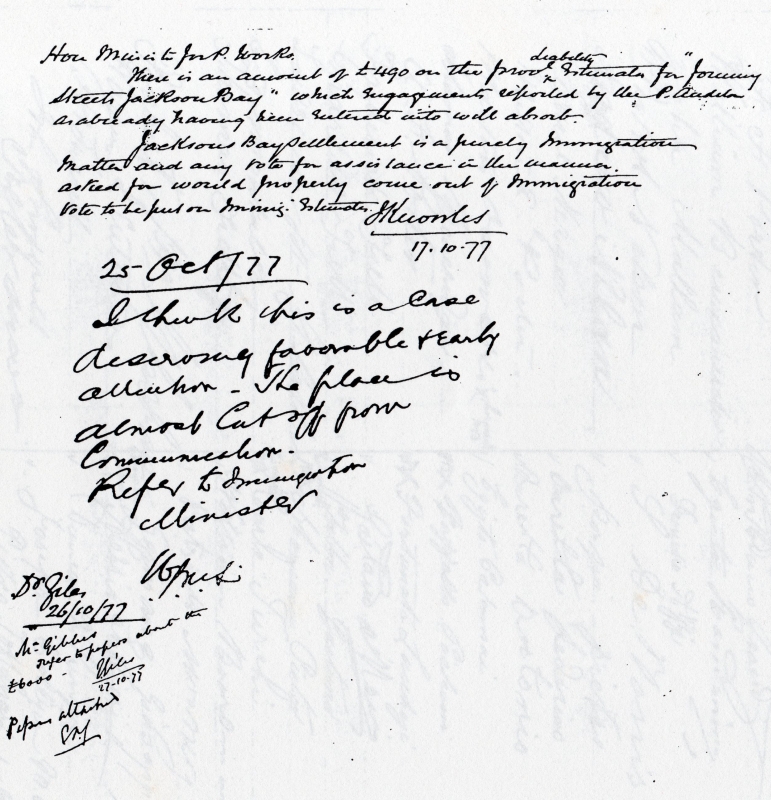
Although the top comment insists that Jackson’s Bay is a “purely immigration matter,” the statement dated 25 October 1877 is telling: “I think this is a case deserving favourable early attention. The place is almost cut off from communication. Refer to Immigration Minister.” Another commissioner wrote “Refer to papers about the £6,000.”
In 1877, William Gisborne was New Zealand's Immigration Minister. Settler Henry Bussell’s name at the top of the petition, and his initialling of other settler’s “marks,” suggest he was one of the organisers who collected the 105 signatures. An English carpenter, he arrived at Jackson’s Bay with his wife and child on 2 February 1875.
De Montalk could not have been at the settlement long before the settlers started organising that particular petition. His signature is not far below August Rosanowski’s, Franz Witzki’s, Franz Kurowski’s, and Robert von Lipinski’s, so perhaps seeing the Polish suffixes swayed his decision to help draw up the latest plea for the completion of the roads, the jetty, the sawmills and the use of a steamer.
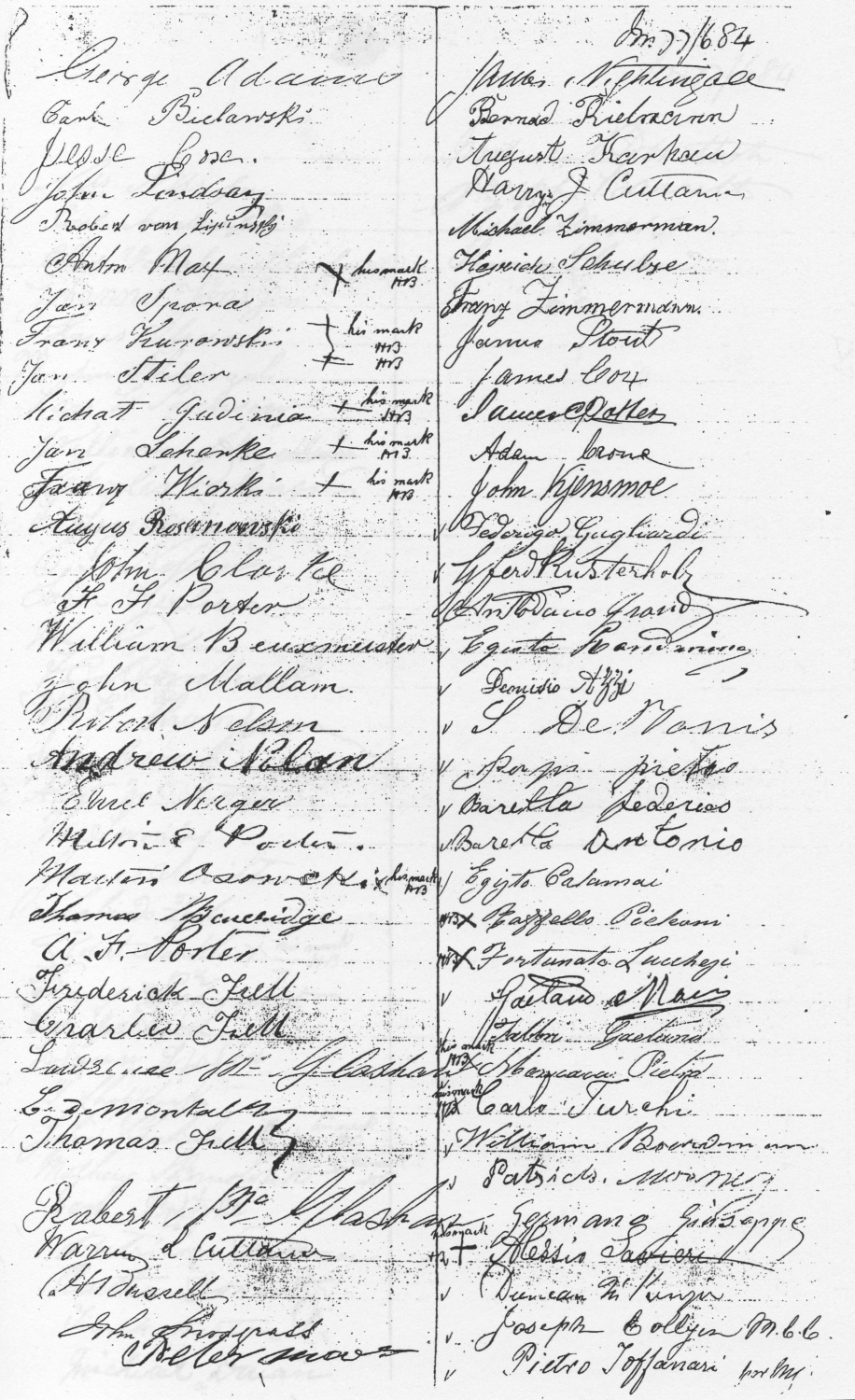
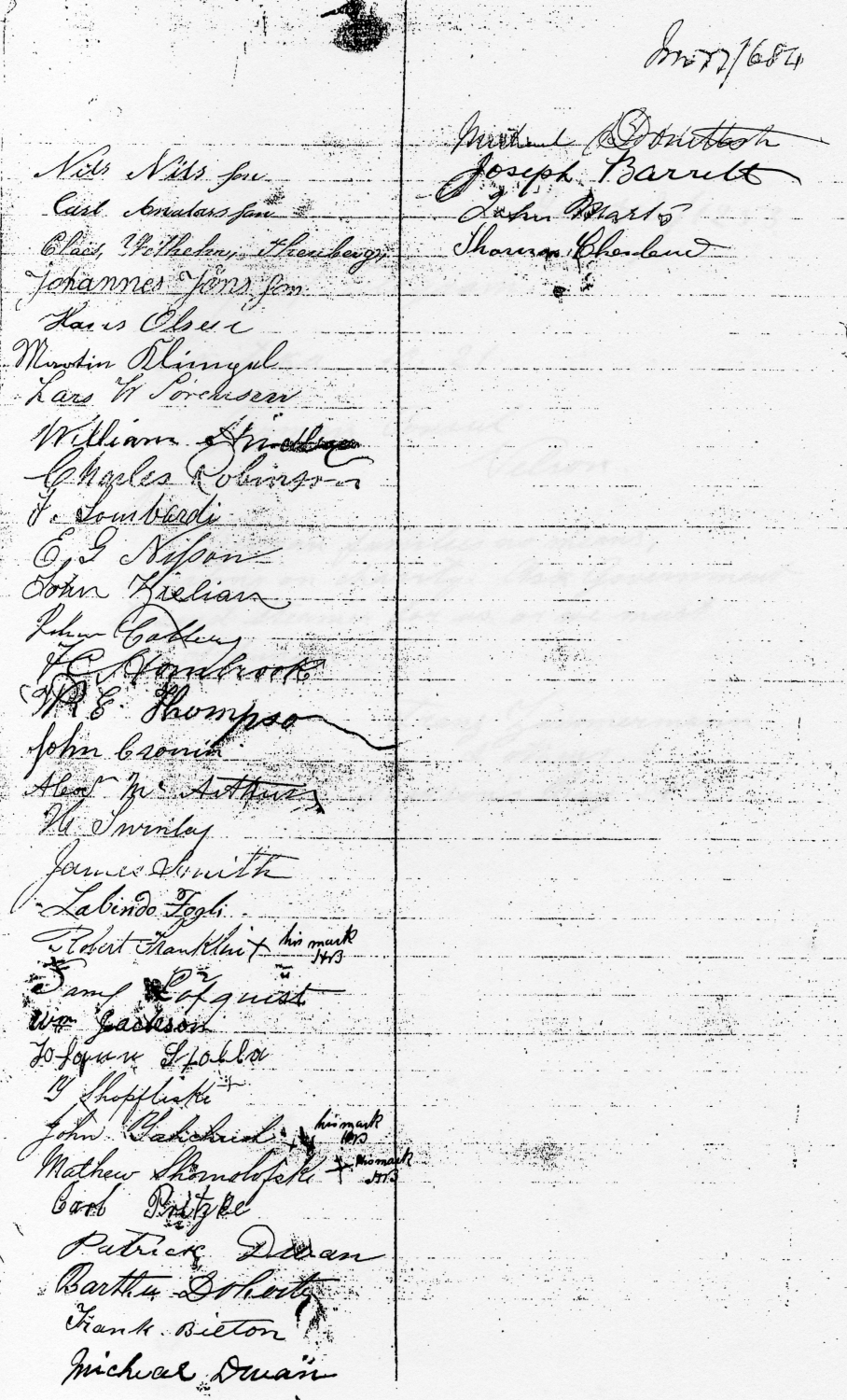
De Montalk at least had the means to leave Jackson’s Bay—and did, moving to Christchurch before June 1878, when he appeared at the presentation of BA degrees at the city’s provincial council chambers. In his absence, the Jackson’s Bay settlers continued to petition for a jetty “completed without delay, and that one of the Government steam-launches be stationed there.” Yet again, the petitions committee deemed the “subject matter” one for the government to consider, and passed it on.96
Bickering over finances and available work escalated when the settlers heard of Wellington’s promise to allocate that extra £6,000 to Jackson’s Bay for roads and bridges “and a portion for prospecting.” (Macfarlane’s request for help with sawmills was rejected.)97
In an attempt to guarantee fair treatment regarding the distribution of labour, the settlers sent a petition in April 1878 to the Minister for Public Works, James Macandrew:
–That the Government be respectfully requested to allow two-third time during the
current year to settlers on works at Jackson’s Bay.
–That the Government be respectfully asked to pay wages in cash instead of cheques.
–That should any settlers obtain work on the Paringa and Haast Track the Government be
respectfully asked not to consider such employment as forming any part of time allowed to such settlers on works at
Jackson’s Bay.
–That the Government be respectfully requested to consider all rents due prior to the 1st January, 1878, as back
debts.
The minister’s blunt reply 12 days later:
I desire at once to disabuse the minds of the settlers as to a mistaken idea which is to be feared is entertained by them—namely, that the Government is bound to find them employment…
What must now be strongly impressed upon the settlers is the absolute necessity of self-reliance: they have received a fair start, and it only requires stout hearts and strong arms to enable them to subsist in comfort and to flourish irrespective of any Government aid.98
Was this a pointless political comment or a carefully considered opinion? te ara, the encyclopedia of new zealand, writes that Macandrew was a trader turned politician known for his “impetuosity” and lavish spending. He claimed to have lost £40,000 in 1860 before declaring bankruptcy—and mocked his subsequent jail sentence by declaring his own house a gaol.99
Wellington acknowledged the miserable conditions in Jackson’s Bay in April 1878, a month after Macfarlane’s annual report. The immigration under-secretary HJH Elliot informed Patten of an arrangement for the steamer maori:
… to convey any of the settlers who may desire to leave the settlement as far as Hokitika, Greymouth or Westport, at a nominal fee… to enable any of the settlers who are absolutely destitute and unable to obtain work at Jackson’s Bay to proceed elsewhere, should they desire to do so.100
By 1878, destitute settlers were leaving Jackson’s Bay whenever they could. Macfarlane, in trying to recover their debts, goaded the remaining disenfranchised settlers into creating a final petition with 36 signatures, this time “complaining of the manner in which the administration of the affairs of the settlement… have been conducted.”101 The Poles relied on translators to explain the wording:
“I was told the effect of the petition would be that it would bring plenty of money into the place and plenty of work, and we should all be all right.”—Martin Klempel.102
“I understood it was because Mr Macfarlane did not give us work enough.”—John Spora.103
“Some parts I understood, some parts I did not.”—Antonio Max.
“I thought it was for the good of the settlement and so I signed it.”—Jakub Czaplewski.104
__________
The petitions infuriated Macfarlane, who refused further work to anyone he found out had signed them.
The final petition became the pivot that ended the settlement, and the £6,000 cash injection into the largely impoverished community could hardly be kept secret. The extra money fanned “strong feelings” from settlers still hoping for employment. Macfarlane claimed the settlers wanted to use the funding to “repudiate their indebtedness to the Government” and was having none of it.
He admitted his attempts at collecting back rents had “given great offence” resulting in an “indignation meeting” and a petition against his management of the settlement.105
In his last statement to the commission, wedged within a report on geology and analysis of minerals, Macfarlane introduced the notion that the Poles’ suffering stemmed from the lack of a church:
… the religious difficulty—especially with the women—had a great deal to do with the discontent. Those of them who refused to land from the “Waipara,” and who were subsequently taken back to Hokitika, told me plainly that they would not live in a place where there was neither church nor priest. Taking it for granted that we are bound to respect the religious opinions and scruples of those who may come amongst us, and having learned sufficient of their habits and modes of living at Home, and how entirely they lean upon and are guided by their religious teacher in all matters, whether spiritual or temporal, to know that a priest having their confidence, and to whom they could resort for advice in their difficulties, was an essential element to their success as settlers. This opinion is based upon my own observation, and upon conversations held with the Rev. Father Binsfeld while on a prolonged visit to Jackson’s Bay.106
__________
All the residents agreed that Jackson’s Bay needed a jetty—still not built by the time the 1879 commission sat. Numerous applications to Wellington for permission to build it fell away until public works minister Macandrew visited Jackson’s Bay in March 1878, and apparently gave his verbal approval to Macfarlane, with the instruction to “push it as quickly as I can.” That instruction clashed with Macfarlane’s submission of the building plans to a Mr Blackett in Wellington, who took the word of a Captain Fairchild of the hinemoa, who said the “work will not stand.” The jetty build stopped after barely 40 metres, and cut piles stacked near the site remained unused.107
A telegram dated 10 July 1878 from the immigration under-secretary:
… engineers and practical persons advise that wharf at Jackson's Bay, if erected to stand, would cost £2,500 [£1,000 more than the original estimate]. Under these circumstances there are no funds available, and work cannot be proceeded with.108
The jetty became the subject of the last letter submitted to the commission, dated 16 April 1879. Mclean Jack, member of the Westland County Council representing Jackson’s Bay, said the settlement could not progress without government help—and a jetty, which he again estimated at £1,500.109
_______________
While officials continued to argue in 1878, circumstances for the Poles at Jackson’s Bay became so dire that Franz Zimmermann sent a telegram to the only person he knew who may have been able to help—the German consul in Nelson. Zimmermann knew that the consul had intervened with the colonial government on behalf of the fritz reuter immigrants in August 1876. Zimmermann's telegram, dated 21 October 1878, used the Poles’ German connection through their country’s Prussian-partitioning, and could not have been clearer:
German families no means, existing on charity. Ask Government to send steamer for us or we must die of hunger.
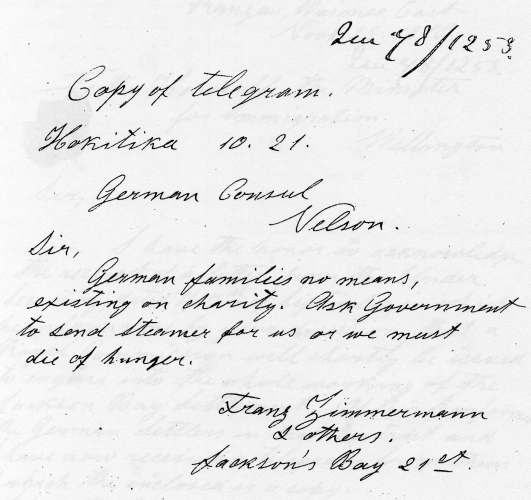
The German consul’s letter to the Minister for Immigration on 25 November 1878, began by acknowledging a Royal Commission that “would shortly be issued to inquire into the whole working of the Jackson’s Bay Settlement.” He enclosed a copy of the telegram, and said he hoped the government would “at once inquire into” the ‘German’ immigrants at Jackson’s Bay and “take such steps as will be necessary to remove them to some other locality.”
By December 1878, 14 of the 28 Polish families remained in Jackson’s Bay. Ten left that December. Six men, seven women and 29 children, boarded the ss stella bound for Taranaki on 17 December 1878. Franz Zimmerman’s daughter Agnes was 10 days old. The passenger manifest spelt the family names: Zimmermann, Beilifski, Stellar, Jacques, Learka, Beleki and the fatherless Cornofski. Apart from the Jacques (Jakusz) family, the others settled in Taranaki, and many of their descendants still live there. (Their current names, variations of the spellings, and some information on what happened to them after their time at Jackson’s Bay, is available through list of early polish settlers.)
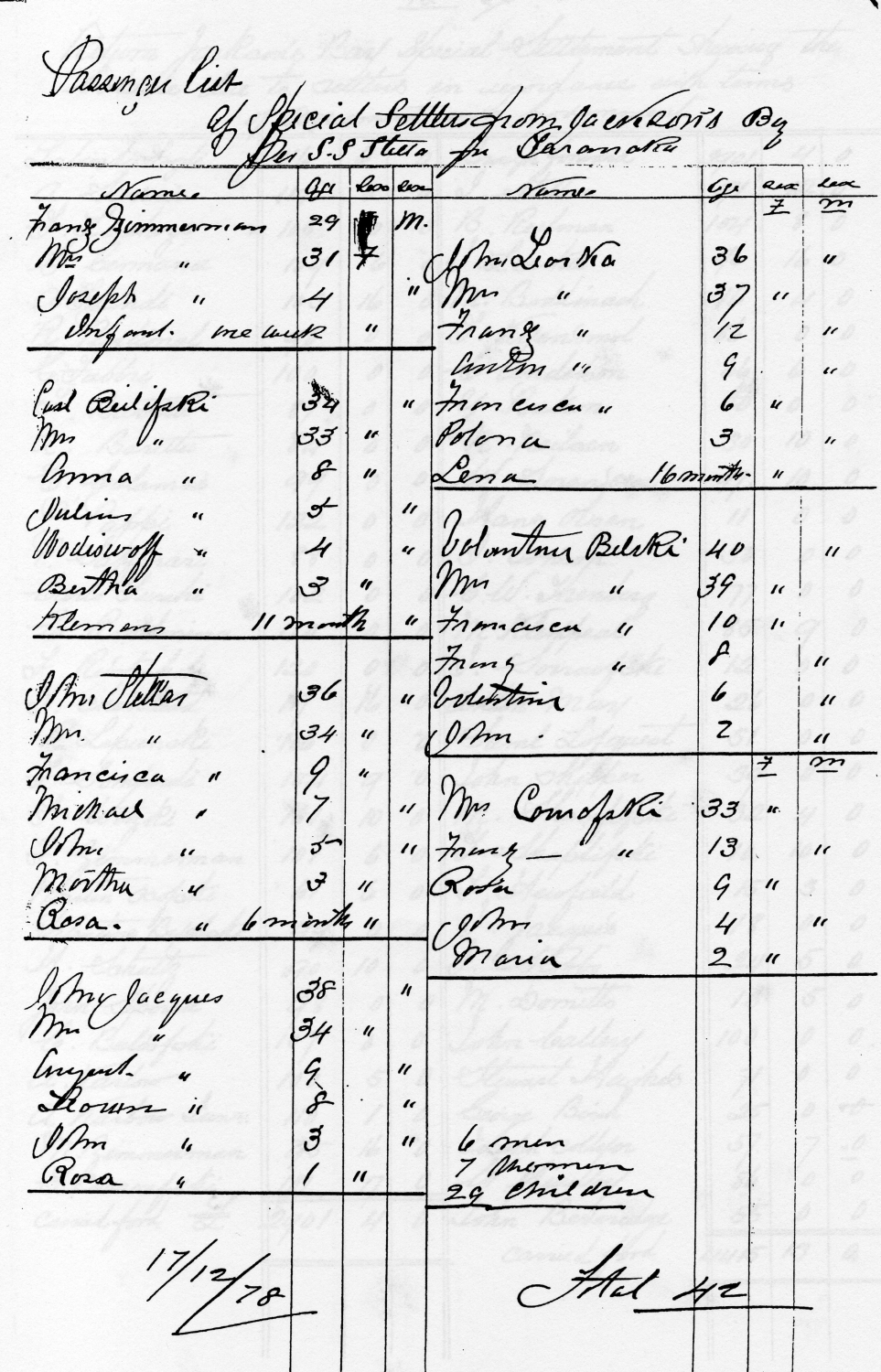
According to the west coast times, the “Collector of Customs” recorded that the Pricki, Gdaniec (WCT spelt it Donitz) and Franz Max families also embarked on the ss stella bound for New Plymouth, but the exact date in December is not clear.110
The Rosanowski family left Jackson’s Bay in January 1879, and the Czaplewski, Spora and the Anton Max families were the last to leave, in April 1879. The Sporas settled in Carterton, and the others in Palmerston North.
_______________
The three commissioners appointed to hear the inquiry into the “working of the Jackson’s Bay Special Settlement,” Henry Bunny, J. Giles and Caleb Whitefoord, had little sympathy for the settlers’ complaints. They concluded:
… we have spent much valuable time in the investigation and discussion of matters in themselves utterly unimportant and frivolous… we have thought it better to be charged with too much minuteness and prolixity rather than give to any an opportunity of saying that we had cut anything short, or shunned any line of inquiry that seemed likely to yield information. It was with this view that we have not only listened to evidence which we considered irrelevant but have obtained returns and statistical information which some might regard as unnecessary.111
The commissioners, who considered settlers’ evidence “irrelevant,” seemed to accept readily officials’ explanations. They thanked Mueller, the creator of the flawed 1874 town plan, and the man who had made such fanciful statements regarding Jackson’s Bay’s potential, “for the most active assistance in every stage of our inquiry, for personal guidance and information in travelling over the district, and for the most elaborate returns, maps, statistics, and reasoned opinions.”
Their long-winded final paragraph leads nowhere. It seems to vindicate their efforts rather than a decision on whether the settlement was, was not, or ever could be, a success—or even a worthwhile venture:
To conclude: If the voluminousness of our report exceeds its interest, as it certainly surpasses our wishes, we trust we may have the satisfaction of thinking that our labour has not been quite useless that we have, perhaps, set at rest many doubts, dissipated many prejudices, and refuted many slanders and of hoping that our conclusions may enable the Government to deal more confidently with the question, the atmosphere surrounding which has been so long obscured by distorted views, and disturbed by dissonant voices, that any knowledge of the truth of the matter began to seem a thing hopeless of attainment.112
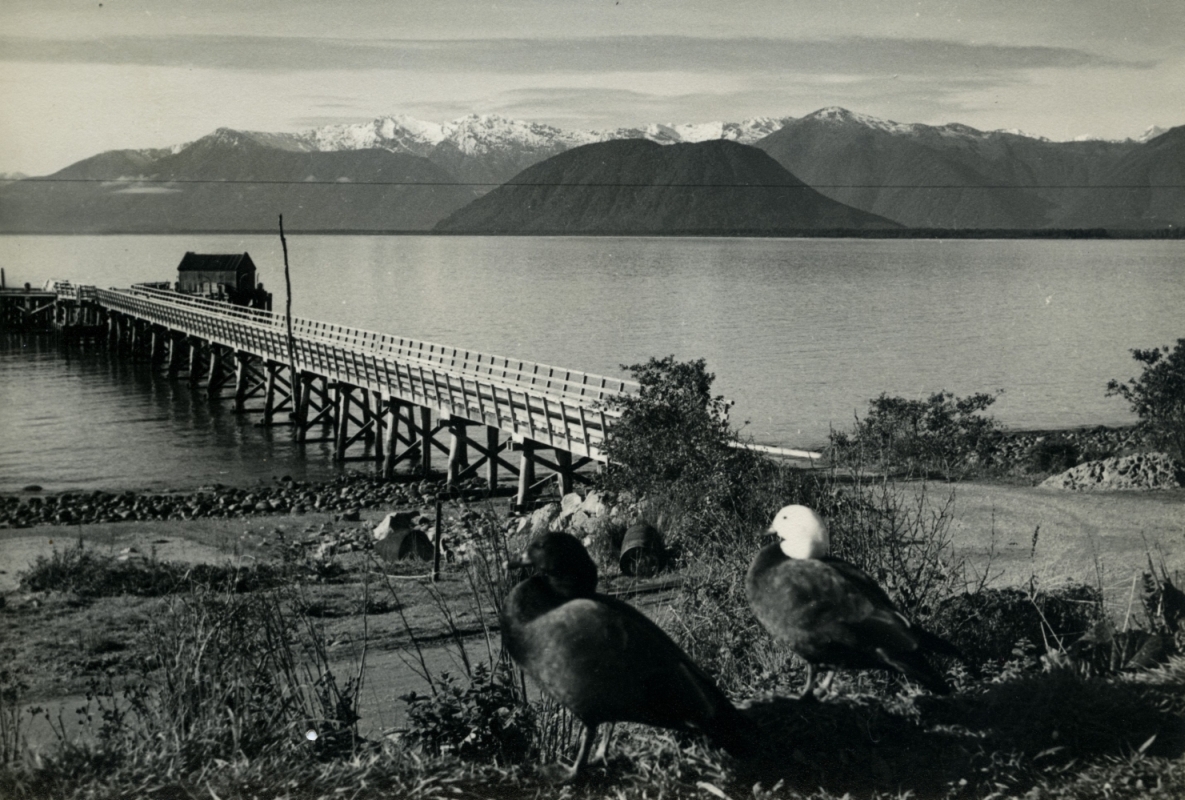
The Jackson Bay wharf today provides a base for local and visiting commercial fishers. This view north towards Haast, Mosquito Hill and the Southern Alps was taken by an unknown photographer circa 1960. (Photograph 007661 from the Hokitika Museum. See below for the full citation.)
Today, only The Esplanade, Pier Street and two portions of High Street appear on the map. The jetty? Finally built in 1937. By then a regular air service to Haast and Okuru had been running for eight years.
© Barbara Scrivens, 2015
Updated April 2021
THANKS TO Bruce Murdoch for giving his permission to use the coloured photographs he took in February 2010.
THE FIVE OLD PHOTOGRAPHS OF JACKSON'S BAY were purchased from the Hokitika Museum and may not be re-used without its permission. The curators may be contacted at their temporary premises at 47 Revell Street, Hokitika, phone +64 (03) 755 6898 or email enquiries@hokitikamuseum.co.nz. Their website is www.hokitikamuseum.co.nz.
THANKS TO Ray Watembach, president of the Polish Genealogical Society of New Zealand, for loaning me a 1998 Zimmermann newsletter dealing with the Jackson's Bay Special Settlement, which contained copies of the original 104-signature petition, the copy of Franz Zimmermann’s 1878 telegram, and the SS Stella passenger list. Also to Robert Hall, who pointed me towards his cousin, the late Peter Zimmermann of Auckland, as the compiler of that newsletter.

ENDNOTES:
- 1 - List of the male settlers taken from the Appendix to the Journals of the House of Representatives (AJHR), 1879, H-9A, JACKSON’S BAY COMMISSION (MINUTES OF PROCEEDINGS, EVIDENCE, CORRESPONDENCE ETC. IN CONNECTION WITH THE), 73 & 74.
- 2 - Ibid, 60–63.
- 3 - This extract from the Grey River Argus, issue 2798, 1 August 1877, page 2, UNTITLED.
Others were:
The Press, 7 August, page 2, NEWS OF THE DAY;
Evening Star, 9 August, page 2, UNTITLED;
Lake Wakitip Mail, 23 August, page 4, ADVERTISEMENTS COLUMN 1;
Auckland Star, 14 September, page 2, UNTITLED and
Thames Advertiser, 18 September, page 2, UNTITLED.
All via Papers Past, through the National Library of New Zealand. - 4 - AJHR, 1877, H-28, SPECIAL SETTLEMENT AT JACKSON’S BAY (REPORT ON THE), page 10.
- 5 - AJHR, 1875, D-05, IMMIGRATION (CORRESPONDENCE WITHIN THE COLONY), page 21.
- 6 - AJHR, 1879, H-9A, JACKSON’S BAY COMMISSION (MINUTES OF PROCEEDINGS, EVIDENCE, CORRESPONDENCE ETC. IN CONNECTION WITH THE), page 9.
- 7 - AJHR, 1875, D-05, IMMIGRATION (CORRESPONDENCE WITHIN THE COLONY), page 16.
- 8 - AJHR, 1879, H-9A, JACKSON’S BAY COMMISSION (MINUTES OF PROCEEDINGS, EVIDENCE, CORRESPONDENCE ETC. IN CONNECTION WITH THE), page 45.
- 9 - Image purchased from Archives New Zealand, Christchurch.
- 10 - AJHR, 1875, D-05, IMMIGRATION (CORRESPONDENCE WITHIN THE COLONY), page 13, enclosure 2.
- 11 - Ibid, page 18, enclosure 25.
- 12 - Ibid, page 11.
- 13 - Ibid, page 9.
- 14 - Ibid, page 14.
- 15 - AJHR, 1879, H-9, JACKSON’S BAY COMMISSION (REPORT OF THE), page 12.
- 16 - AJHR, 1875, D-05, IMMIGRATION (CORRESPONDENCE WITHIN THE COLONY), page 12.
- 17 - Beaglehole, JC ed., The journals of Captain James Cook on his voyages of discovery, Vol. 2.
Cambridge: Hakluyt Society, 1961, pages 136 & 137. Quote found through Te Ara, The Encyclopedia of New
Zealand.
http://www.TeAra.govt.nz/en/sandflies-and-mosquitoes/page-1. - 18 - West Coast Times, issue 2907, page 2, TUESDAY JANUARY 19, 1875, Papers Past, through the National Library of New Zealand.
- 19 - AJHR, 1875, D-05, IMMIGRATION (CORRESPONDENCE WITHIN THE COLONY), page 16.
- 20 - Ibid, 10 & 17.
- 21 - Ibid, 17 & 18.
- 22 - This and the paragraph above, AJHR, 1875, D-05, IMMIGRATION (CORRESPONDENCE WITHIN THE COLONY), page 9.
- 23 - Ibid, page 15.
- 24 - AJHR, 1876, D-02, LETTERS FROM THE AGENT-GENERAL, page 25, no. 42.
- 25 - AJHR, 1876, D-01, LETTERS TO THE AGENT-GENERAL, 8, 11 & 12.
- 26 - AJHR, 1876, D-06, GENERAL REPORTS OF IMMIGRATION OFFICERS, page 5.
- 27 - AJHR, 1879, H-9A, JACKSON’S BAY COMMISSION (MINUTES OF PROCEEDINGS, EVIDENCE, CORRESPONDENCE ETC. IN CONNECTION WITH THE), 21 & 5.
- 28 - Ibid, 25 & 26.
- 29 - AJHR, 1877, D-01, IMMIGRATION TO NEW ZEALAND (LETTERS TO THE AGENT-GENERAL), page 3, item 3.
- 30 - Ibid, page 4, item 6.
- 31 - AJHR, 1876, A-08, DEATH OF DR FEATHERSTONE, AND TEMPORARY APPOINTMENT OF SIR W TYRONE POWER, KCB, AS HIS SUCCESSOR, page 1.
- 32 - AJHR, 1877, D-01, IMMIGRATION TO NEW ZEALAND (LETTERS TO THE AGENT-GENERAL), page 8.
- 33 - AJHR, 1876, D-06, IMMIGRATION, GENERAL REPORTS OF IMMIGRATION OFFICERS, page 8.
- 34 - AJHR 1876, D-02, LETTERS TO THE AGENT-GENERAL, page 3.
- 35 - AJHR, 1875, D-05, IMMIGRATION (CORRESPONDENCE WITHIN THE COLONY), page 15.
- 36 - AJHR, 1876, D-06, IMMIGRATION, GENERAL REPORTS OF IMMIGRATION OFFICERS, page 11.
- 37 - AJHR, 1879, H-9A, JACKSON’S BAY COMMISSION (MINUTES OF PROCEEDINGS, EVIDENCE, CORRESPONDENCE ETC. IN CONNECTION WITH THE), 16 & 45.
- 38 - Ibid, 30 & 16.
- 39 - Ibid, page 45.
- 40 - Ibid, page 51.
- 41 - Ibid, page 14.
- 42 - Ibid, page 18.
- 43 - AJHR, 1879, H-9A, JACKSON’S BAY COMMISSION (MINUTES OF PROCEEDINGS, EVIDENCE, CORRESPONDENCE ETC. IN CONNECTION WITH THE), page 45.
- 44 - This and the two paragraphs above, Ibid, page 27.
- 45 - Ibid, page 39.
- 46 - Ibid, 46 & 19.
- 47 - West Coast Times, issue 3237, 9 February 1876, page 2, GERMAN IMMIGRANTS FOR JACKSON’S BAY. THE REASONS FOR THEIR RETURN, Papers Past, through the National Library of New Zealand.
- 48 - Ibid.
- 49 - This and the four paragraphs above, AJHR, 1879, H-9A, JACKSON’S BAY COMMISSION (MINUTES OF PROCEEDINGS, EVIDENCE, CORRESPONDENCE ETC. IN CONNECTION WITH THE), page 48.
- 50 - Ibid, page 50.
- 51 - West Coast Times, issue 3237, 9 February 1876, page 2, GERMAN IMMIGRANTS FOR JACKSON’S BAY. THE REASONS FOR THEIR RETURN, Papers Past, through the National Library of New Zealand.
- 52 - Ibid.
- 53 - Ibid.
- 54 - Ibid.
- 55 - Ibid.
- 56 - Ibid.
- 57 - Ibid.
- 58 - Ibid.
- 59 - Ibid.
- 60 - AJHR, 1876, D-03, IMMIGRATION TO NEW ZEALAND (LETTERS TO THE AGENT-GENERAL TRANSMITTING REPORTS ON IMMIGRANT SHIPS), page 30.
- 61 - Mundy, Daniel Louis, Looking along Revell Street, Hokitika. New Zealand Free Lance: Photographic
prints and negatives. Ref: PA1-f-041-38. Alexander Turnbull Library, Wellington, New Zealand.
http://natlib.govt.nz/records/22778354. - 62 - Ring, James, 1856-1939. Unidentified group, Jackson Bay.
Ref: 1/2-022634-F. Alexander Turnbull Library, Wellington, New Zealand.
http://natlib.govt.nz/records/23054773. - 63 - AJHR, 1879, H-9A, JACKSON’S BAY COMMISSION (MINUTES OF PROCEEDINGS, EVIDENCE, CORRESPONDENCE ETC. IN CONNECTION WITH THE), pages 17 & 31.
- 64 - AJHR, 1877, H-28, SPECIAL SETTLEMENT AT JACKSON’S BAY (REPORT ON THE), page 5.
- 65 - Otago Daily Times, issue 4345, 22 January 1876, page 5, A COMPLAINT FROM JACKSON’S BAY, Papers Past, through the National Library of New Zealand.
- 66 - Grey River Argus, issue 2373, page 2, PUBLISHED DAILY SATURDAY, MARCH 18, 1876, Papers Past, through the National Library of New Zealand.
- 67 - Full letter in AJHR, 1879, H-9A, JACKSON’S BAY COMMISSION (MINUTES OF PROCEEDINGS, EVIDENCE, CORRESPONDENCE ETC. IN CONNECTION WITH THE), pages 77–78.
- 68 - Ibid, page 75.
- 69 - Ibid, page 79.
- 70 - Bradshaw, Julia, The Far Downers, The People and History of Haast and Jackson Bay, Otago University Press, first published 2001, page 39. ISBN: 978-1-877276-07-1.
- 71 - AJHR, 1879, H-9A, JACKSON’S BAY COMMISSION (MINUTES OF PROCEEDINGS, EVIDENCE, CORRESPONDENCE ETC. IN CONNECTION WITH THE), 33 & 39.
- 72 - Ibid, page 39.
- 73 - Ibid.
- 74 - Ibid, 30 & 31.
- 75 - Ibid, 45 & 67–70.
- 76 - This and the paragraph above, AJHR, 1877, H-28, SPECIAL SETTLEMENT AT JACKSON’S BAY (REPORT ON THE), page 1.
- 77 - Ibid, page 5.
- 78 - AJHR, 1879, H-9A, JACKSON’S BAY COMMISSION (MINUTES OF PROCEEDINGS, EVIDENCE, CORRESPONDENCE ETC. IN CONNECTION WITH THE), page 32.
- 79 - Ibid, 45 & 46.
- 80 - Group of surveyors. Mueller family: Photographs.
Ref: PAColl-4363-1-7. Alexander Turnbull Library, Wellington, New Zealand.
http://natlib.govt.nz/records/23065156<. - 81 - This and the three paragraphs above, AJHR, 1879, H-9A, JACKSON’S BAY COMMISSION (MINUTES OF PROCEEDINGS, EVIDENCE, CORRESPONDENCE ETC. IN CONNECTION WITH THE), page 54.
- 82 - AJHR, 1875, D-05, IMMIGRATION (CORRESPONDENCE WITHIN THE COLONY), page 10.
- 83 - Grey River Argus, issue 2014, 21 January 1875, page 2, gives a full list of the general conditions of the settlement issued by the Westland Provisional Government, Papers Past, through the National Library of New Zealand.
- 84 - AJHR, 1877, H-28, SPECIAL SETTLEMENT AT JACKSON’S BAY (REPORT ON THE), page 3.
- 85 - This and the paragraph above, AJHR, 1879, H-9A, JACKSON’S BAY COMMISSION (MINUTES OF PROCEEDINGS, EVIDENCE, CORRESPONDENCE ETC. IN CONNECTION WITH THE), page 19.
- 86 - Ibid, 26 & 96.
- 87 - Ibid, 50 & 33.
- 88 - Ibid, 29 & 25.
- 89 - Ibid, 91 & 16.
- 90 - Ibid, 6 & 91.
- 91 - Ibid, page 51.
- 92 - Ibid, page 5.
- 93 - Ibid, page 51.
- 94 - Ibid, 48 & 49.
- 95 - AJHR, 1876, I-06, REPORT ON THE PETITION OF ANDREW STENHOUSE AND OTHERS, pages 26 & 27.
- 96 - AJHR, 1878, I-02, REPORTS OF PUBLIC PETITIONS COMMITTEE No.186 JACKSON’S BAY SETTLERS, page 15.
- 97 - AJHR, 1877: H-28, SPECIAL SETTLEMENT AT JACKSON’S BAY (REPORT ON THE), page 10.
- 98 - AJHR, 1878 D-06 JACKSON’S BAY SPECIAL SETTLEMENT (PAPERS RELATING TO), pages 8 & 9.
- 99 - Olssen, Erik. Macandrew, James, from the Dictionary of New Zealand Biography. Te Ara - the
Encyclopedia of New Zealand, updated 12 November 2013.
http://www.TeAra.govt.nz/en/biographies/1m1/macandrew-james. - 100 - AJHR, 1878, D-06, JACKSON’S BAY SPECIAL SETTLEMENT (PAPERS RELATING TO), page 5.
- 101 - AJHR, 1879, H-09, JACKSON’S BAY SPECIAL SETTLEMENT COMMISSION (REPORT OF THE), page 1.
- 102 - AJHR, 1879, H-9A, JACKSON’S BAY COMMISSION (MINUTES OF PROCEEDINGS, EVIDENCE, CORRESPONDENCE ETC. IN CONNECTION WITH THE), page 33.
- 104 - Ibid, page 34.
- 104 - This and the previous statement, Ibid, page 39.
- 105 - AJHR, 1878, D-06, JACKSON’S BAY SPECIAL SETTLEMENT (PAPERS RELATING TO), page 4.
- 106 - AJHR, 1879, H-9A, JACKSON’S BAY COMMISSION (MINUTES OF PROCEEDINGS, EVIDENCE, CORRESPONDENCE ETC. IN CONNECTION WITH THE), page 102.
- 107 - AJHR,1878, D-06, JACKSON’S BAY SPECIAL SETTLEMENT (PAPERS RELATING TO), page 4.
- 108 - AJHR,1879, H-09, JACKSON’S BAY SPECIAL SETTLEMENT COMMISSION (REPORT OF THE), page 16.
- 109 - AJHR, 1879, H-9A, JACKSON’S BAY COMMISSION (MINUTES OF PROCEEDINGS, EVIDENCE, CORRESPONDENCE ETC. IN CONNECTION WITH THE), page 105.
- 110 - West Coast Times, 19 December 1878, page 2,
https://paperspast.natlib.govt.nz/newspapers/WCT18781219.2.6 - 111 - AJHR, 1879, H-09, JACKSON’S BAY SPECIAL SETTLEMENT COMMISSION (REPORT OF THE), page 19.
- 112 - Ibid.
